
Labour Gains, and Pains
20.09.24
A unique reading guide provided by Mark Perryman to the hopes, and fears, of what this Labour government might achieve
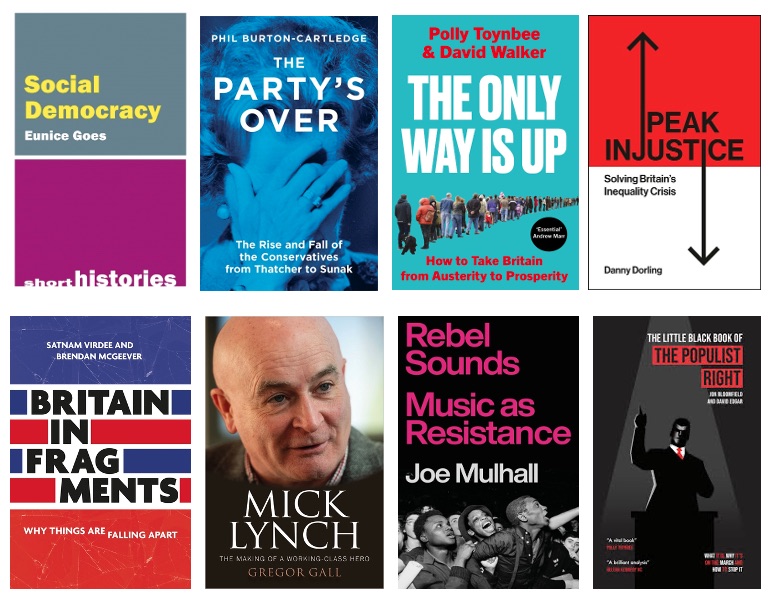
04.07.24 a Labour landslide of historic proportions. We can argue the toss about turnout, vote share, the rise of the Greens, independents taking Labour seats but a Labour win is a win, and perhaps more joyously a Tory defeat, a defeat. Hurrah!
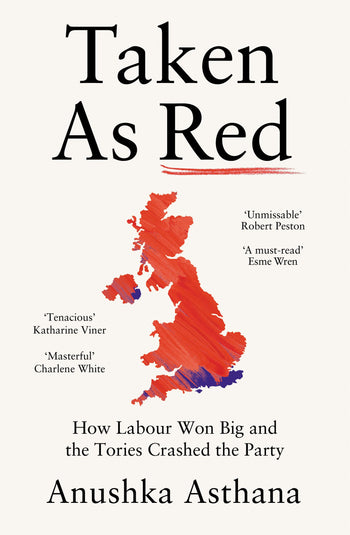
For an instant account of Labour's campaign, look no further than Taken as Red: How Labour Won Big and the Tories Crashed the Party by Anushka Asthana. The access and contacts via Anushka's role as ITV's Deputy Political Editor and prior to that Chief Political Correspondent on The Times opened almost every door imaginable. Readers will have differing views what the many campaign revelations tell us about Keir Starmer's Labour, all will find them spellbindingly interesting!
Of course over its history Labour has spent considerably longer in opposition than in office. For those of a certain vintage the past 45 years scarred in our memory: Wilson/Callaghan 5 years, Thatcher/Major 18 years, Blair/Brown 13 years, Cameron (with a little help from Clegg)/ May/Johnson/Truss/Sunak another 14 years. Add it all up that's 32 years of Tories vs 18 years of Labour. So it seems appropriate to start with Mark Garnett, Gavin Hyman and Richard Johnson's Keeping the Red Flag Flying: The Labour Party in Opposition since 1922. Quite how 'red' that flag has been for the best part of a century readers will no doubt argue the toss over.
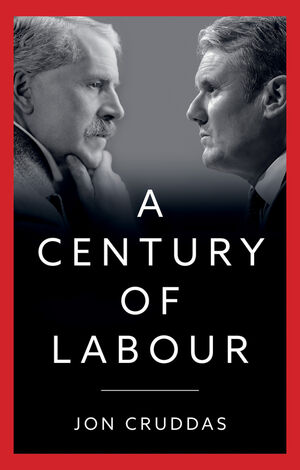
To help settle that never-ending argument look no further than A Century of Labour by Jon Cruddas, marking the centenary of the first Labour government,1924, with an unashamedly partisan account of the party's record when in power ever since. And written by the major figure of the short lived post-Blair 'soft left' the absence of which in the Starmer era has much weakened Labour's well-worn aim to be a 'broad church'. A shorter time span, but one more familiar to most readers, is admirably covered by Patrick Diamond's The British Labour Party in Opposition and Power 1979-2019: Forward March Halted? Though what would the much-missed Eric Hobsbawm, author in 1978 of the original The Forward March of Labour Halted? have made of the Miliband-Corbyn-Starmer years?
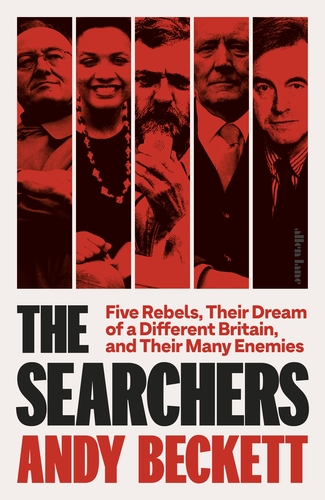
Instead of a broad party Labour has become increasingly polarised with the Labour Right ruthlessly suppressing its opposite number, the Labour Left. Tony Benn, Ken Livingstone, Diane Abbott, John McDonnell and Jeremy Corbyn collectively, the badge 'hard left' worn by all 5 with considerable pride. A tendency that post-Corbyn has gone the same way as the soft left, bordering today on extinction. Andy Beckett tracks the evolution of this tendency through the years of growth, the 1970s framed by the victorious 1972 and 1974 Miners strike and the emergence of Bennism in When the Lights Went Out. And he followed this with Promised You a Miracle the early 1980s reign of Thatcherism triumphant, the Falkands War, the end of the Bennite insurgency and a hapless Labour Party led by Michel Foot. In his new book The Searchers : Five Rebels, Their Dream of a Different Britain, and Their Many Enemies Andy revisits the beginning, middle and end of this history-in-the- making to bring it bang up to date and makes a compelling case for what the party loses when the hard left, from Benn to Corbyn, forced into involuntary absence. A left that whatever its faults, this would be the subject of another book, mixes heady idealism, dogged determination and more fresh thinking than they are often given credit for.
Diane Abbott's memoir A Woman Like Me is an absolute testament to what Labour loses when this narrowing goes unchallenged, recognised across Labour's spectrum with the breadth of resistance to Keir Starmer's ill-conceived plan to ban her from standing in the 2024 General Election. And a book with a rich vein of humour, intended or otherwise. Read Diane's account of her romance with Jeremy Corbyn and just try to stop yourself laughing out loud!
A new generation of thinkers and writers who orient around Labour manage to combine critique with an unwillingness to write off the party in government as an agent of change for the better. Futures of Socialism: 'Modernisation', the Labour Party, and the British Left, 1973-1997 by Colm Murphy expertly tracks the evolving, and sometimes competing, debates as Labour shifted over the course of two and a bit decades from The Alternative Economic Strategy to the abandonment of Clause Four. The shift from Corbynism to Starmerism has been considerably swifter, we await to see for better or worse. Karl Pike in his Getting over New Labour: The Party after Blair and Brown makes a compelling case for not conducting any assessment of Starmer in terms of compare and bombast with 1997-2010. Instead, he urges we understand that while identifying continuities has its place, accounting for the differences is far more interesting, and important.
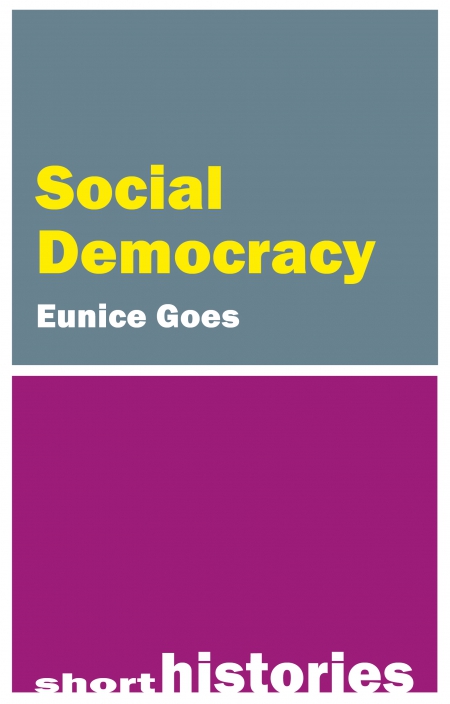
My stand-out title for making sense of Starmer in power is from Eunice Goes, her short book Social Democracy is a handy ready-reckoner of how social democrats, epitomised today by Keir Starmer and Rachel Reeves, seek to square the circle of the radical and democratic, or as Labour's General Election campaign oxymoronically sloganised 'Change and Stability'.
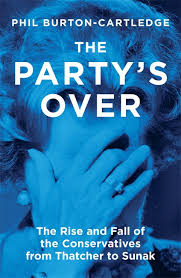
And the Tories? Phil Burton-Cartledge can justifiably say 'I told you so' until the end of his days. The Party's Over: The Rise and Fall of the Conservatives from Thatcher to Sunak was originally published as Falling Down in 2021. Back then Boris Johnson was still basking in the vain glory of his 2019 landslide and the comprehensive breaching of Labour's red wall. Few doubted, certainly not the salaried commentariat, Labour was in dire straits and the Tories set for umpteen more years in power. Phil did doubt, uniquely revealing the underlying trends that would lead not so much as Labour winning in 2024 as the Tories losing.
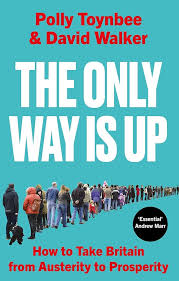
If Labour is to turn 2024 into the basis of a victory that lasts more than anything it must transform an unequal Britain. Polly Toynbee's writing exposing inequality is all the more effective coming as it does not from the oppositional left. Instead she makes a constructive yet not uncritical case why Labour must place the necessity of this transformation at the very centre of politics, gently egging Labour on both to recognise this and act upon. Her latest book, with co-author David Walker, The Only Way is Up : How to Take Britain from Austerity to Prosperity should be essential reading for every Labour MP, adviser and campaigner not only with an eye on winning again in 2029 but why it would deserve to do so.
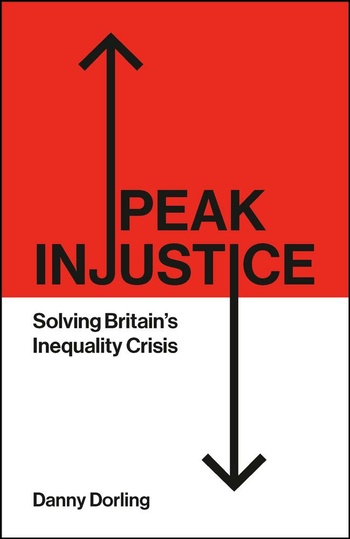
By some considerable distance Danny Dorling is not only the most compelling author on inequality but the most prolific too. In 2023 Danny's Shattered Nation: Inequality and the Geography of a Failing State provided a survey of poverty's impact across all points of Britain, north, south, east and west. A kind of Road to Wigan Pier, with the statistics. Then earlier this year his Seven Children: Inequality and Britain’s Next Generation added a biographical dimension of children's lives and aspirations from across the income bracket that every parent and teacher will readily recognise and any Labour government should seek to change. And now, just in time for when Labour reaches its first 100 days in goverment on 17 October Peak Injustice: Solving Britain's Inequality Crisis a primer of richly ambitious yet entirely practical policy ideas that is essential reading for anyone who wants Labour in power to fulfil its promise of 'change' with changes that rapidly affect for the better those most urgently in need of change.
Mary O'Hara's new book Austerity Bites 10 Years On : A Journey to the Sharp End of Cuts in the UK revisits the places and communities she first wrote about in her 2014 book, Austerity Bites. Since then what has another decade's worth of Tory socially-engineered desolation achieved? Read it and then ponder what Labour in the likely scenario of two terms could achieve in the next decade to reverse this unwanted legacy.
For an account of when governments fail in such a project, and instead cruelly worsen the situation of those who can least afford it The Department: How a Violent Government Bureaucracy Killed Hundreds and Hid the Evidence Disabled activists recently raised the money to deliver a free copy of this extraordinary book of investigative journalism by John Pring, himself disabled, to every one of our 650 MP's. Let's hope they not only read it but act upon it too.
The mining valleys of South Wales occupy a special place in left folklore. The 1926 General Strike, the miners who joined in their hundreds the International Brigade to fight fascism in Spain, the miners strike of 1984-85, and that's just for starters. Brad Evans puts the present, poverty-stricken plight of the valleys in the context of this uniquely heroic past. How Black Was My Valley: Poverty and Abandonment in a Post-Industrial Heartland.
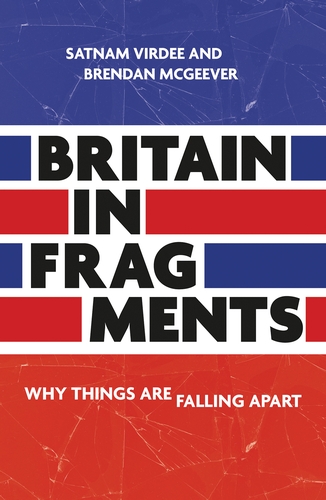
To fully understand 14 years of Tory-engineered inequality Satnam Virdee and Brendan McGeever's all-embracing account, and solutions too, Britain in Fragments: Why Things are Falling Apart is my first choice as a book to read, inform and inspire. They put this entire sorry tale of inequality, injustice and austerity into one single account every bit as much about problem-solving as problem-accounting, no easy task. They achieve it by explaining why democratic reform, the renewal of a failing welfare state, a popular anti-racism, a reinvention of class politics and recovering from the Brexit are all interlinked as solutions to a failing system.
Meanwhile Keir Starmer's in-tray is full of a host of issues each pressing for urgent, and radical, attention. In Louise Haigh, alongside Angela Rayner and Ed Miliband, Keir Starmer's cabinet has at least some breadth of ideas on 'how' though restricted of course by Cabinet rules of collective responsibility. Nevertheless, each has already spearheaded the rapid and radical implementation of policies on transport, green energy and housing.
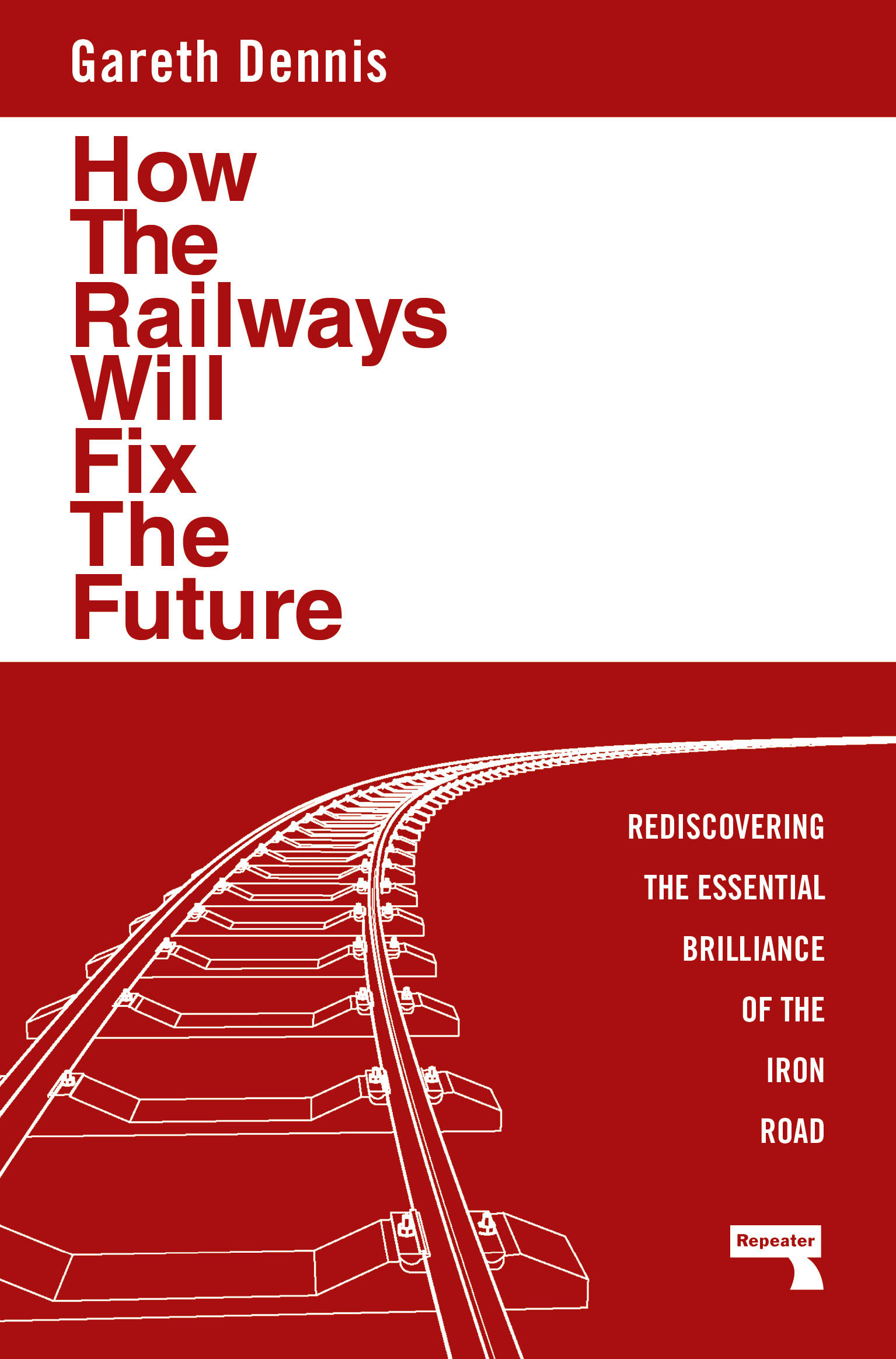
How the Railways will Fix the Future: Rediscovering the Essential Brilliance of the Iron Road by railway engineer and RMT member Gareth Dennis sets out in expert detail the huge potential of an entirely publicly owned train system run for the benefit of serving communities and a key resistance to the rapidly emerging climate emergency. And attractively priced at just £10.99 cheaper than most currently overpriced train tickets.
For a generation of urban voters rent and landlordism is an absolutely central issue. The Rentier State: Manchester and the Making of the Neoliberal Metropolis by Isaac Rose powerfully argues why a direct, statist, challenge to the rental industry would be just about the most popular policy Labour could enact and help restore the party's increasingly fragile support in what were previously Labour's metropolitan urban heartlands. Yes, rent controls and ending no fault evictions are a welcome start but what about who owns the properties in the first place?
Will Labour make such a challenge? Grace Blakely outlines in Vulture Capitalism: Corporate Crimes, Backdoor Bailouts and the Death of Freedom both precisely why it should and won't. From housing to football clubs via high street fast food outlets to almost every part of the country's manufacturing sector our's is an economy, society even, entirely owned by global corporations. And as Grace patiently explains for the non-specialist reader the failure to challenge this salient fact is absolutely central to Labour's inability to recognise how it is neoliberalism that has afforded this takeover.

The Spanish Civil War, the Soviet crushing of the Hungarian revolution, the Vietnam War, Apartheid South Africa, Iraq, each in their different ways shaped a political generation. And each in their different ways distanced that generation from Labourism as an institution, body of ideas and vehicle for undiluted progress. In 2024 Gaza is doing the same. Despite, once again, some early moves in the right direction; the partial arms ban, restoring some humanitarian aid funding, not opposing the legality of the indictment of Netanyahu as a war criminal, for today's political generation this isn't nearly enough from any Labour government and the idea that this disconnect will pass with the passage of time a dangerous fiction. For an insight into why Gaza won't simply disappear as a cause read Gideon Levy's courageously dissenting reportage from inside Israel on both the aftermath to the horrors of 7 October and the punishment of Gaza via mass devastation and indiscriminate killing on an unimaginable scale ever since in The Killing of Gaza: Reports on a Catastrophe. And for the historical background IIan Pappe's Ten Myths about Israel is an absolutely essential read. Note, Gideon and IIan are both Israelis and Jewish, their parents fled Europe to what was then Palestine in the 1930s to escape the Nazis. Remember this when reading these two extraordinary books and the foul assertion that to be a critic of Israel and its guiding ideology, Zionism, is to be antisemitic.
Seeking to muster discontent during Labour's first 100 days will be a diverse range of political forces. Amongst the most vocal, and belligerent will be the placard-providing Far Left of a wide variety of acronyms.
The not much lamented Workers Revolutionary Party (WRP) in the 1980s had a certain political presence via its daily paper Newsline, well-funded local youth-training centres, and its most prominent members, Vanessa Redgrave and her lesser known brother Corin. Behind all this was one Gerry Healy, and when his multiple sins were finally revealed the WRP split in time honoured fashion in multiple directions, all claiming of course, to be the one and only 'true' WRP. The Party is Always Right: The Untold Story of Gerry Healy and British Trotskyism by Aidan Beatty tells this entire sorry tale in highly readable and fascinating detail.
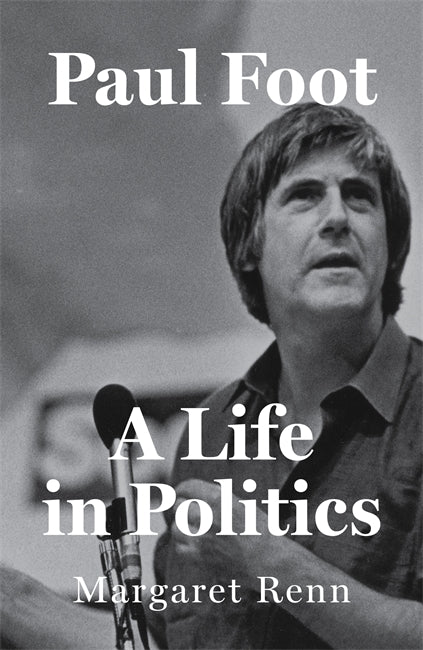
Paul Foot would have denied it vigorously via a vigorous and richly humorous polemic but as a Trotskyist and, to use the vocabulary, 'leading member', for most of his life of a Trotskyist party, in Paul's case, the Socialist Workers Party (SWP), he shared a not entirely dissimilar political disposition to Healy. But then in so many other ways they couldn't be more different. A supremely gifted writer, a dogged investigative journalist exposing injustice where he could find it, his journalism every bit at home in Private Eye, the Daily Mirror, the London Review of Books as Socialist Worker.A revolutionary who counted Shelley and Orwell as much of an influence on his politics as Lenin and Trotsky. And most of all one of the finest and funniest orators for the cause one was ever likely to hear. All this and more retold in Margaret Renn's biography Paul Foot: A Life in Politics.
As for the theorising of the Far Left, much of it I can do without, no thankyou very much. But in amongst the spurious rewrites of 1917, the 2024 version, there is a depth of thinking us lightweight reformists would do well not to dismiss. AntiCapitalist Resistance (yes really) is the stillborn descendant, many splits and versions along the way, of arguably the most creative of the 1968 crop, the International Marxist Group (IMG), best known member another brilliant writer and orator, Tariq Ali. The Resistance (no, don't laugh) have recently published Palestine and Marxism by Joseph Daher which refreshingly free of the 1917 era jargon provides a theoretical framework to understand Gaza a much wider audience than the Far Left would do well to engage with, if not entirely subscribe to.
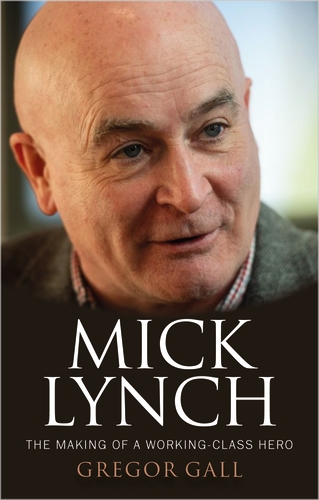
These groups, and as the saying goes there's 57 varieties and counting, number a few hundred members each, only the SWP numbers in the few thousand. None have anything like the reach of the hero of the TV and radio station studio take-down of all things establishment, including the Labour Party establishment, RMT General Secretary Mick Lynch. Gregor Gall's Mick Lynch: The Making of a Working Class Hero meticulously analyses Mick's irresistible rise as the polar opposite to Keir Starer's rise over roughly the same period. Will Mick prove to be Keir's worst nightmare? This is my top choice of a read to gives an understanding of the most effective opposition Keir could face if his promise of change fails to deliver improvements for the many and leaves the few's wealth unscathed (to adapt a Corbynist, via Shelley, slogan). A book which gives a very good idea how Mick, and, arguably the equally combative yet more successful in terms of industrial action, Unite's Sharon Graham, might be key figures to shape precisely this kind of opposition.

Not that a resurgent, and campaigning trade unionism will be sufficient, not by a long way. There is a now a deeply rooted tradition of social movement organising that absolutely must be part, parcel and central to any movement committed to ensuring we receive the very best this Labour government can deliver. That tradition in many ways has its roots in 1970s second wave feminism, the interaction of socialism and feminism epitomised by the publication in 1979 of the path breaking Beyond the Fragments co-authored by Sheila Rowbotham, Lynne Segal and Hilary Wainwright. Sheila revisits the immediate political aftermath of the book's publication in her latest memoir Reasons to Rebel: My Memories of the 1980s a beautifully written reminder for those who were there for the early years of Thatcherism. A brilliantly written social history for those who weren't.

Edited by Joshua Virasami A World Without Racism: Building Antiracist Futures helps us to understand the very welcome fact that in the 2000's antiracism has become every bit as much an irresistible force of change as feminism became in the 1970s, most recently via the huge global response to the Black Lives Matter movement. Joshua has expertly curated a wide range of contributions including on solidarity and internationalism, antiracist tenants movements and organising as migrants that help portray the depth of this welcome shift.
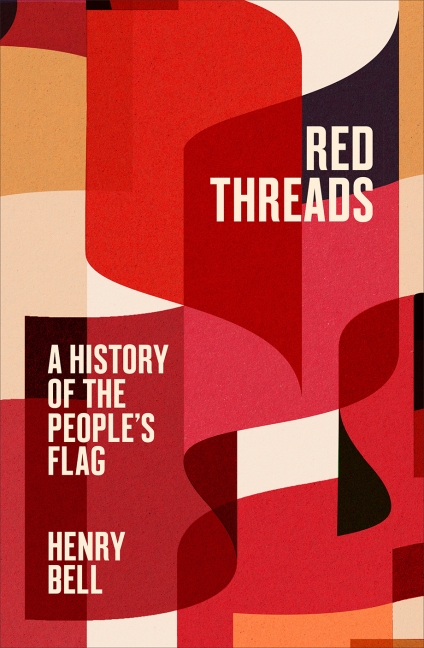
Perhaps what this great movement of a broad church Labour, outside left, trade unions, social movements needs most of all instead of a thought-out plan of action is a banner to rally behind. And fortunately rescued from 'modernisation' and dusted down all ready to go we have one. Red Threads: A History of the People's Flag is a book like no other, Henry Bell's absolutely fascinating history of the Red Flag. C'mon as the song goes, raise the scarlet standard high!
Mmm, maybe even with a techno remix not quite the dance number to get down with Gen Z. Brat? I hardly think so. But at least the thought was there. Or as the anarcho-feminist Emma Goldman famously put it, " If I can't dance, it's not my revolution." Amen to that, well without the anarchism, obviously. No fun, no thanks,
Toby Manning's Mixing Pop and Politics: A Marxist History of Popular Music disavows all this. OK I'll admit 'A Marxist history' doesn't exactly overflow with the pleasure principle I was looking for in a sub-title but stick with it. Over 500 plus pages a soundtrack ranging from doo-wop, soul and psychedelia to glam, punk, rap and grunge had me crying out for more.

The moment this idea ,a guilt-free pleasure in enjoying ourselves as how we 'do' our politics rather than the elevation of a privileged 'activist class' first, and forever after, made sense to me was in Victoria Park, Hackney, Sunday 30 April 1978. The Clash, Tom Robinson Band, Steel Pulse, X-Ray Spex, the first Rock against Racism Carnival. Bablyon's Burning: Music,Subcultures and Anti-Fascism 1958-2020 by Rick Blackman helpfully provides a richly researched hisory of a clash of culture, rebel music and protest politics as an opposition from the 1958 Notting Hill race riots to the rising tide of anti-immigration racism of the current decade.
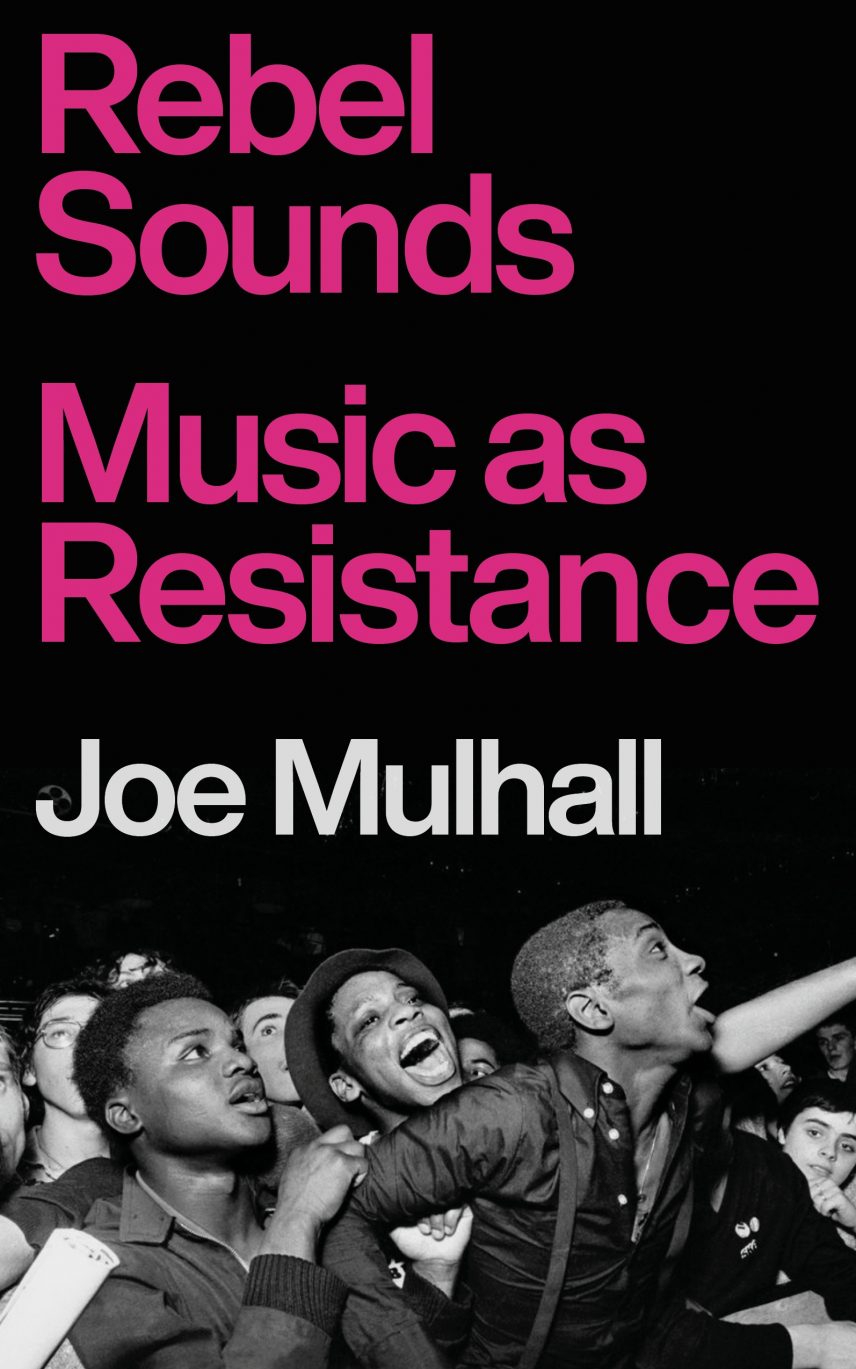
Topping my hit parade for reading on the subject of how pop 'n politics makes has the potential to make such a rich mix Joe Mulhall's Rebel Sounds: Music as Resistance. Best known as a writer and researcher on modern-day fascism there couldn't be a better author to write a counterfactual account of an anti-fascism, and anti a whole lot more too that is rotten in our society, as musical resistance. Global in reach too, Irish rebel songs, the soulful background music to America's civil rights movement, underground gigs in the old Eastern Europe behind the Berlin Wall, the township rhythms that belted out a soundtrack to the toppling of Apartheid South Africa. Joe recounts a politics that looks as good on the dancefloor as on the march.
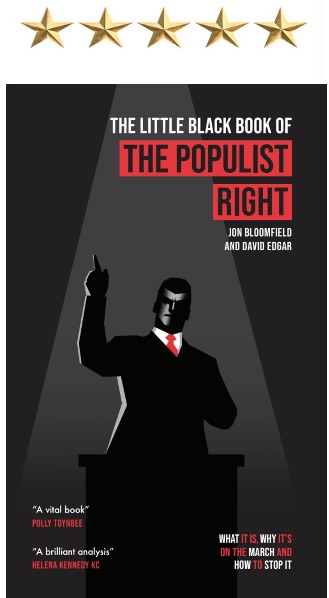
And to complete this reading guide my five star choice for the most essential book to read as Keir Starmer's government heads towards its first 100 days in office? Just 120 pages, easy enough to digest in a single day's reading yet couldn't be more necessary, and urgent, to do so. The Little Black Book of the Populist Right: What it is Why it's on the March and How to Stop it by Jon Bloomfield and David Edgar. Those involved in the August race riots have been clamped down upon, but neither the very real social problems that at least in part sparked the anger behind them nor the racism that used this as a reason to violently lash out at asylum seekers, immigrants and Muslims have gone away. Both the Populist Right and Far Right will be doing their worst to keep this anger at inequality and austerity entirely within a racist narrative. And across Europe it's no better, rather considerably worse: Germany, France, Italy, the Netherlands and in America, Trump. This short but brilliant book is both a road map to the nightmarish future which Labour missteps through these first 100 days could produce and a vital guide to why we don't necessarily have to end up with such a sorry ending by 2029. Read and resist.
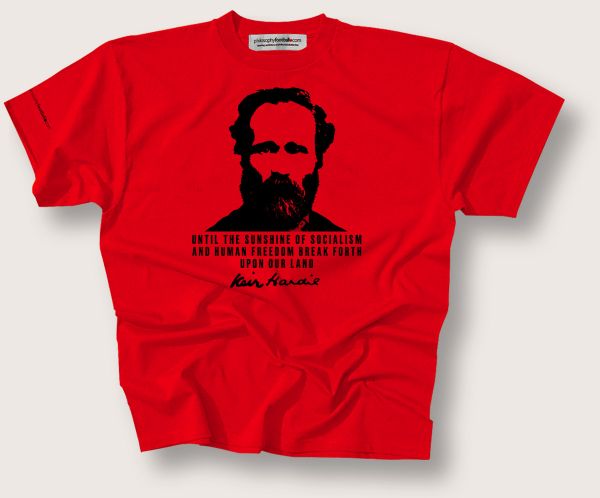
The one and only original Keir T-shirt available from here
Note No links in this review are to Amazon. If you can avoid purchasing these books from a site that tax dodges and exploits its workers, please do.
Mark Perryman is currently working on a new book The Starmer Symptom to be published by Pluto in autumn 2025. Co-founder of Philosophy Football, Mark's previous books include The Blair Agenda and The Corbyn Effect.
Straight out of Tadworth,Surrey
31.08.24
With a Rock against Racism relaunch being planned Mark Perryman remembers being there the first time around
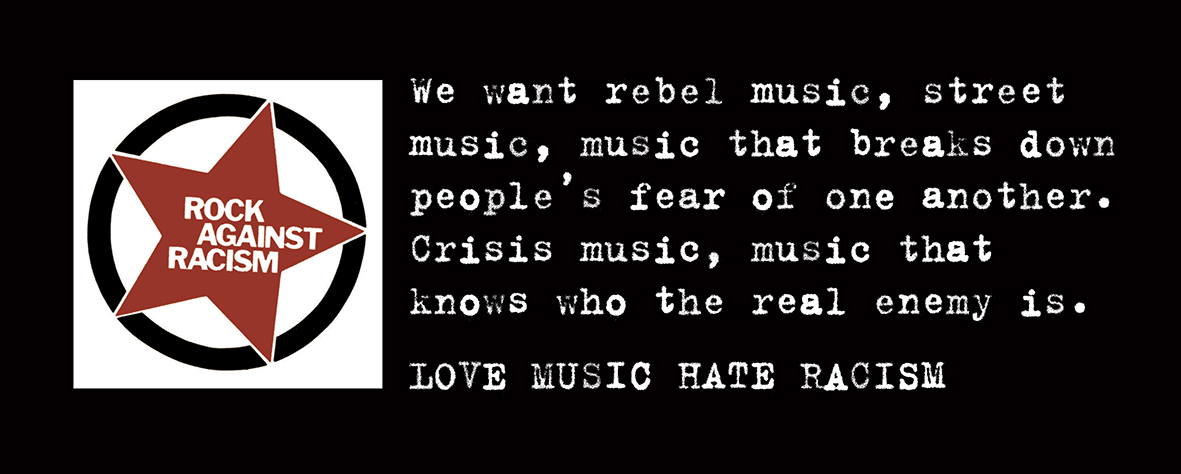
In the wake of this summer's racist riots a 'relaunch' of Rock against Racism by the campaign Love Music Hate Racism is being planned. Great news for those of us who were schoolkids against the nazis the first time around. But without getting all dialectically correct its vital to understand the conditions that made RAR such a rip-it-all-up and start again success back then and ask ourselves what would make it work now almost half a century later and scarcely nothing the like of it in-between.
I can still remember the day as if it was yesterday, Sunday 30 April 1978. Me, Jeremy Turner, Ashley Stark, Deborah Tween in the Surrey commuter belt village of Tadworth. It was early, we had a bus to catch, then the Northern Line from its southernmost tip, Morden, before a couple of changes to Bethnal Green. Off we got, me with A-Z in hand, to pick our way through unfamiliar surroundings to what we realised was the wrong end of Victoria Park. A boating lake? Surely this wasn’t the place for a Carnival. But then we saw it, a huge, if rather ramshackle stage, with people pouring into the area in front of it from every direction. We’d arrived.
No, we hadn’t gone on the march. I was in the Upper Sixth at the local comprehensive, De Burgh, the others from the year below me. We were musos, every week we devoured the New Musical Express which with a rather brilliant mix of the political and the cultural had been carrying news of the growth of Rock against Racism, known to everyone as ‘RAR’ alongside breathlessly enthusiastic reporting of the emergence of punk, the two of course weren’t un-related. Meantime on the news the National Front, NF, were kicking their way into the headlines. Every march a violent confrontation between them and the recently formed Anti-Nazi League, ANL. This was horrible, these were Nazis isn’t that what our parents and grandparents fought to defeat?
The others were there more or less for the music and the urban adventure. What a line-up, and it was free. But we were nervous too, as we had picked our way through Hackney to the park we were convinced we’d be set upon by Nazi thugs round every corner. Nervous? Scared rigid in my case. So going on the march was a bit beyond the scale of our commitment and what was marching for any way? Of course when I saw that huge, joyful, powerfully surging crowd arrive all the way from Trafalgar Square with enormous paper maché heads of NF leaders John Tyndall and Martin Webster at the front I immediately regretted not joining in, and I’m not sure my political credibility has ever recovered since either.
Waiting for the music to start we wandered round the stalls. Most didn’t interest us, socialist this, revolutionary that, communist the other. It was the dayglo RAR stickers I was after and anything with that brilliant ANL arrow on too please, comrade, as I soon learned to say. Somewhere along the line I was pestered by a particularly persistent member of the Revolutionary Communist Party into buying a scarcely readable pamphlet on why Labour was an imperialist party. I think I’ve still got it, the single tract that came closest to putting me off the Left for life, sorry, comrades, was the first one I ever shelled out for. Every other word an ism or an ist, nobody any good but the followers of the one true faith, the certainty in being right unquestionable, those who were wrong risible. Blimey was this what I was getting into?
But then, thankfully, the music kicked in. There was this bloke up on stage in a boiler suit who seemed to be running proceedings but he was totally unlike any figure of authority I’d ever come across before. He was a livewire of infectious enthusiasm, he made us all, whether on stage or in the crowd, hardened politico or slightly wayward sixth-formers from Surrey feel like we belonged. Polly Styrene belting out Oh Bondage, Up Yours! helped too. I’m not sure I even knew what bondage was back then but that saxophone riff and a young woman screaming the words into the microphone was more than enough for the crowd to erupt. I’d never seen anything like it, a seething mass of intermingled bodies throwing themselves into the air seemingly without a care in the world. Except we did care. These bands were the voices of our moment, The Tom Robinson Band, The Clash, Steel Pulse, Misty and Roots, Patrik Fitzgerald. They wrote songs about what we cared about, against the NF, for the kind of place we felt Britain and the world could be but without all those isms and ists.
After Victoria Park my teenage contribution to this was pestering the ANL office for supplies of their leaflets. Up and down the roads of my Surrey village Banstead I’d go popping the leaflets though letterboxes, 'Never Again' stickers up on every bus stop. Quite what the locals thought goodness only knows. Either the place was about to be invaded by Nazi thugs or their rampaging opponents, possibly both. Still it made me feel like I was doing something. I’d been inspired. I’d become politically active, as I soon learned to describe myself.
What made RAR so special, for me at any rate, was that it was fun. There was even a RAR badge that turned NF into No Fun. They, the Nazis, were against the multicultural Britain we were becoming and behind that miserable mask of their's was something even worse, Nazism. In the late 1970s there remained a generation, like my parents, framed by the war, the Second World War. It hadn’t yet become the stuff of make-believe nostalgia and ritualised ceremony it was part of daily family lives. And so when the ANL stuck the word Nazi, deservedly so, on the racist NF we had won and the other lot lost.
And then of course we learned that you didn’t have to be a Nazi to be a racist. Wrap it up in the so-called respectability of warning against our culture being ‘swamped’, describing our nation’s borders as reaching ‘breaking point’ or predicting a community will be a ‘tinderbox’ because of immigration and its no longer Nazi, just plain nasty, and wrong.
RAR absolutely convinced me that effective collective action against all this means involving most of all those who otherwise might not think of themselves as ‘political’, not part of existing campaigns, a politics that is popular. It is a lesson too much of the Left that I've been part of ever since that first Carnival, never fails to forget. We revel instead in the cult of the activist, we privilege the most committed, the dedicated. What RAR constructed instead was a politics no longer restricted to these hardened souls but a mass movement rooted in community and locality, mixing ramshackle organisation and glorious spontaneity with the ability and imagination to pull off free carnivals that attracted tens of thousands and tours that covered pretty much the entire country. All of this was the creation of a musical generational moment, punk, with an essential reggae mix. And when RAR ended in the early 1980s 2-Tone kind of took over with the bands' line ups, music, dance moves rocking against racism writ so large we no longer needed to spell it out. And yet this summer, racist riots and a political discourse that can barely find a good word for immigration and asylum, anti-racism, multiculturalism and multifaith.
In his superb book Beating Time: Riot 'n' Race 'n' Rock 'n Roll ( out of print, to properly understand RAR beg, steal, or borrow a copy) one of the founders of Rock against Racism, David Widgery, described it as:
"A rank-and-file movement of the ordinary, the unknown and the unkempt outside of conventional politics, inspired by a mixture of socialism, punk rock and common humanity got together and organised to change things."
And you know what? Having dusted down all my nostalgia masquerading as a political strategy and finding someone far hipper to today's beat than me to delete 'punk rock' and insert the 2024 equivalent that's pretty much just the kind of movement needed if any Rock against Racism 'relaunch' is to succeed.
An earlier version of Straight out of Tadworth was originally published in Roger Huddle and Red Saunders (Eds) Reminiscences of RAR : Rocking against Racism 1976-1982
Mark Perryman is the co-founder of the self-styled 'sporting outfitters of intellectual distinction' aka Philosophy Football
The Rock against Racism 2024 T-shirt is available from Philosophy Football here

Keir gets in a Saint George's Day mix-up
23.04.24
Philosophy Football's Mark Perryman worries Keir Starmer doesn't know his England from his Britain

Keir Starmer has taken it upon himself to celebrate Saint George's Day by urging all Labour General Election candidates 'with enthusiasm.' Perhaps if Keir feels the need to 'urge' the enthusiasm of celebrating he's missing the point of celebrating Saint George.
I don't need any such instruction thank you very much. Every England home game I'm with a bunch of friends at Wembley on the morning of matchday laying out thousands of cards to form a huge fans' Saint George Cross flag. And every Euro or World Cup summer I'll be bedecked in a Saint George Cross somewhere about by person. And no, I don't need reminding 23rd April is Saint George's Day either.
Keir has backed up all this instructing by writing ahead of Saint George's Day for the Sunday Telegraph on his theme ' I have no time for those who flinch at our flag.' Well it might help if Keir could get the flag right. Throughout the piece he lists off a nation's achievements to celebrate: the home front sacrifice of 1939-45, working-class students able to go to university, creating the NHS. Magnificent achievements to be proud of as a nation, Britain, not England alone. It is the classic yet crucial slippage, England used to represent not itself but three other nations, Scotland, Wales and the North of Ireland too.
A pedant, me?
Well first off get yourself to Scotland and ask any passing Scot what they feel about England being used to represent them. Good luck with that.
And on the way back south of the border ask yourself how it feels to be in an England that is denied all manner of identifications that Scotland enjoys.
Keir's Labour party membership cards in Scotland carry the Saltire, in Wales the Welsh flag. Labour membership cards in England? The Union Jack. No wonder Keir is confused.
In Scotland and Wales Labour has its own Scottish and Welsh Labour parties, their own conference, their own leadership. In England, no such English Labour Party. And no sign in his article Keir is in favour of one.
Unlike Scotland and Wales England doesn't have a National Anthem to call our own, instead God Save the King, anthem of the United Kingdom. I know Keir is in favour of 'fiscal discipline' but here's a change that doesn't cost a penny.
Jeremy Corbyn added some substance to his very similar calls for what some Labour types label 'progressive patriotism.' Saint Andrew's, David's, George's and Patrick's days public holidays for the Scots, Welsh, English and Northern Irish. With a General Election in the offing what a trick to be missed, who's ever going to vote against an extra day off work?!
And since 1999 Scotland and Wales have a parliament, an assembly to call their own. Nothing of the sort for England, we should have, and anywhere but London too.
Most people are deeply cynical of politicians. A performative politics of this sort, adopting a position for the instant-gratification of changing the image of a party, or leader, but with no practical outcomes to effect change. All good reasons for such cynicism. A politics riddled with contradictions, that actually reproduces the problem at hand but with sufficient spin to fleetingly impress regardless. What good is that?
Keir, by the time of the next Saint George's Day not much doubt you'll be Prime Minster. No longer simply writing articles but in office, to make change. So when you fly Saint George on the 23rd April outside Number Ten just don't forget there's a nation it belongs to.
Mark Perryman's book Breaking up Britain: Four Nations after a Union is available from here
St George's Day Special Offer 20% off all Philosophy Football Saint Georges Day T-shirts quote coupon StGeorgePFN here
What's there to get hot under the England collar about?
30.03.24
Philosophy Football's Mark Perryman gets to grips with Nike v St George
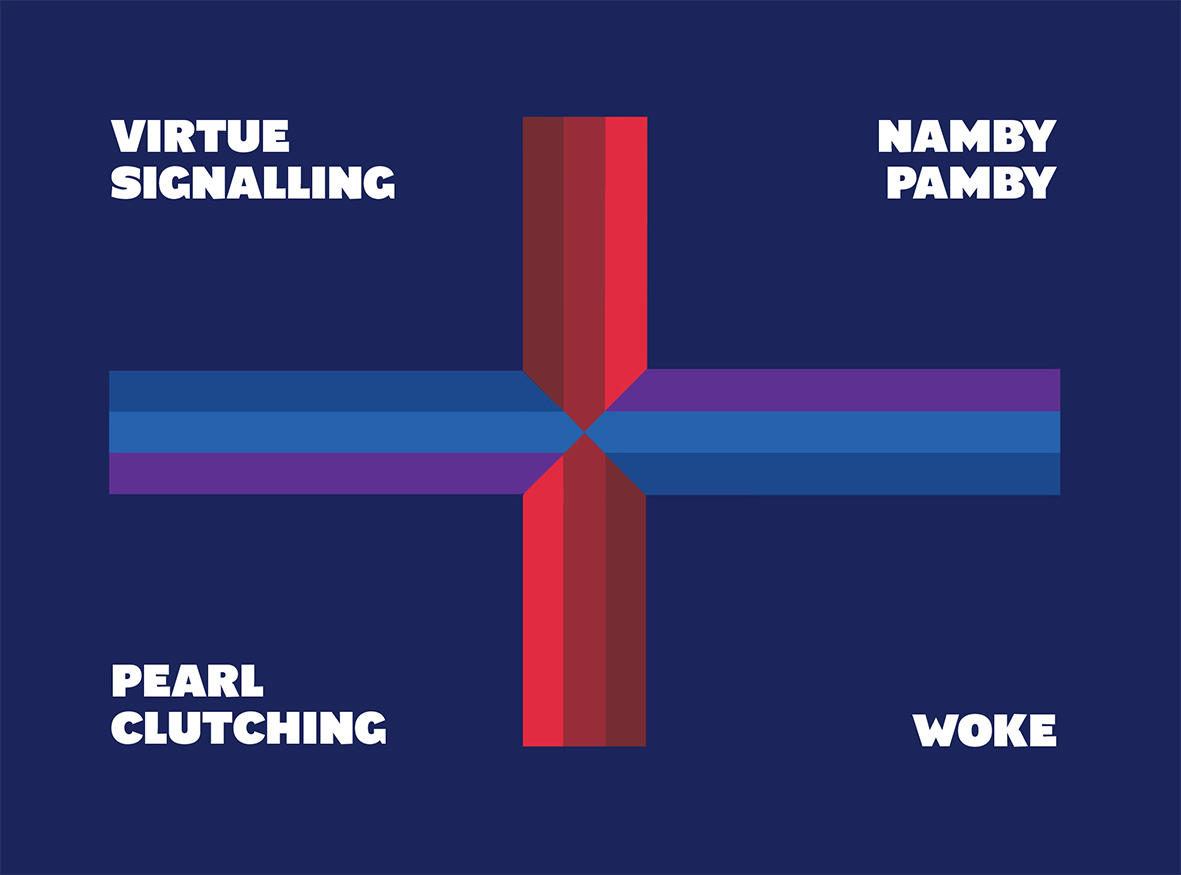
"This virtue signalling, namby-pamby, pearl-clutching, woke nonsense must stop now. Any more and I'll be on the first flight to Rwanda." Lee Anderson MP
Wembley Stadium, early morning last Saturday with a bunch of friends I spent four hours laying out 7000 cards that just before kick-off for England v Brazil were held up by fans to form a huge St George Cross.
I've been doing the same for the past 26 years. So do I have a view on 'shirt-gate'. Yes, just a bit.
'Raise the Flag' started in 1998 after I went to Rome for Italy v England, a vital World Cup qualifier. A night of mayhem, Italian fans chucking everything they had at us, the Italian riot police wading in to England's end with their batons flying, not caring who they hit, and after the game (the best 0-0 I've ever seen, England had qualified for World Cup '98) we're all kept back for 2 hours with the lights off.
However just before kick off the Italian fans had held up cards to form the Italian flag. It was a magnificent sight. Which left me thinking why don't we do something like that for England? It took six months to persuade the FA but for the last home friendly before France '98 with Philosophy Football co-founder Hugh Tisdale adapting the ingenious Italian's 'mosaic' method to Wembley and thousands of England fans holding up red and white cards to form a huge St Grorge Cross Flag we finally did it. And ever since.
For me and Hugh 'Raise the Flag' has become a small business organising stadium crowd effects, mainly for football, some rugby, London 2012, the late Queen, Take That and Bruce Springsteen. But for England games we do the effect on a not-for-profit basis because it all began with us being England fans.
And for all those countless fans' St George Cross flags we've created not once have we seen the need to add a line of navy blue, indigo, purple, scarlet or brown. It's our flag so why mess with it?
But then no flag has ever been created by a fashion company.
Long ago Nike gave up being an outfit producing kit for serious sportsmen and sportswomen. That's an historic side-line, for Nike their big business today is as a fashion brand. Whether its trainers or England shirts what they're selling is fashion not something to actually play sport in. And with a football shirt design for entirely commercial reasons only lasting a maximum of two years this necessitates a new look to make a basic kit colour, a white shirt in England's case, different. Hence the multicoloured flag, and nothing to get too hot under the collar about (sic).
Rather more irksome is why change the kit every two years at all? To make money of course, and at an almighty £125 for the match replica version, £85 to be worn in the stands. That's for something that is basically a bri-nylon T-shirt, with a sell-by date of two years hence. And unless England win the World Cup wearing it, 58 years and counting, never likely to be worn again. So of course a touch of colour to the flag to make the 2024 edition of this vastly overpriced short life item is what is required to make it a tad different because this kind of thing is what the entire replica shirt business is based on.
Me, I prefer the sheer simplicity of the flag. The ways fans make it our own. Nobody forces us to hold up those cards to 'Raise the Flag' we do it because we want to, it means something to us. But best of all how fans 'deface' the flag, adding our club name and badge, pub, family and mates' names to make it truly ours.
A bri-nylon, overpriced and short shelflife England shirt? Despite following England to four World Cups, four Euros and countless away trips I've never seen the need to purchase one. Preferring (obligatory product placement) a tournament T-shirt instead from... Philosophy Football.
And as for those manufacturing all this confected rage.
Nigel Farage, Barbour jacket and corduroy trousers never ever, seen him in an England shirt, have you?
Rent-a-gob Lee Anderson, the man who boycotted England's first time since 1966 in a Tournament Final, Euro 2021, because they're now a team of the 'woke' aka they take the knee as an act of solidarity with all, including team mates, who face racist abuse or worse.
Keir Starrmer so eager to please he tells the Sun he's against the St George Cross being tampered with. This from a leader who cares so much about the St George flag he authorised Labour Party membership cards in Scotland with the Scottish Saltire on them, fine; in Wales with the Welsh Flag on them, good; but in England no St George Cross on Labour membership cards. Opportunism and hypocrisy doesn't even begin to describe this Sir Keir.
It's our flag.
It's not a fashion item.
It's not a battleground for politicians' soundbites.
And we're perfectly capable of making what we will with it ourselves. No thankyou very much.
 Philosophy Football's Lee Anderson St George Cross T-shirt is available from here
Philosophy Football's Lee Anderson St George Cross T-shirt is available from here
Mark Perryman is the co-founder of the self-styled 'sporting outfitters of intellectual distinction' aka Philosophy Football
Lee Anderson St George Cross image by Hugh Tisdale after Nike.
The Enemy Within
24.02.2
Philosophy Football's Mark Perryman digs deep to find for the 40th anniversary
of the start of the 1984-85 Miners Strike an enduring significance

Amidst the 1984-85 Miners strike eruption activist-sociologist Huw Benyon
edited a collection of reports and analyses Digging Deeper. From the coalfields’
frontline his introduction captured the mood of living through this significant
time perfectly:
“The miners’ strike of 1984-85 is a landmark in the political and economic
development of post-war Britain. In the breadth of the issues involved, and in
the drama of its action, it stands out – even to the casual observer – as a
major social and political event. In its compass it is quite staggering. Initiated
by a threat to cut capacity and jobs in the coal industry it is the first major
strike of any duration to be fought over the question of employment. Viewed
in the context of the near calamitous decline of jobs in manufacturing industry,
and the sharp rise in unemployment, the strike stands like a beacon. In the
sincerity of the people involved – women and men – as they talk about the
threat to mining villages, to ‘whole communities’ and to the futures of their
children, the strike evokes a deeply human response. Since March 1984 this
response has been forthcoming from supporters, in groups and as individuals,
throughout Britain and Europe. The yellow stickers of the NUM, 'Dig Deep for
the Miners' and 'Coal not Dole', have spread far beyond the coalfields.”
But the sad fact is the 1984-85 strike proved a landmark in all the wrong ways.
A major social and political defeat, for a trade union, for whole communities,
for an entire body of ideas of what class and solidarity means. A landmark
defeat and one we are still living with the consequences of four decades on.
Does this decry what was achieved in those 12 months? No not a bit of it, but
only if what made this strike such a special event is properly understood. The
spectacular revival of support and solidarity as a key element of Labour's, and
well beyond, organisational culture.
Doreen Massey and Hilary Wainwright's chapter in Digging Deeperargued a
key part of this revival were the Miners Support Groups. They located this
geographically, in the ‘big cities’ that shared a socio-economic situation and
commonality of culture accelerated by the impact of Thatcherism.
“A great mix of industries, including services, and a variety of jobs. Many of
those in work are on low pay, in casual occupations, working in small firms,
and in many areas levels of unionisation are low.”
And what this in part produced as a city’s population was significant too.
“An enormously diverse population: in many cities ethnic minorities, gay and
lesbian communities, women’s groups and ‘alternative’ networks of many
kinds form an important element. The trade union movement is also different
from that in the coalfields. Here its very industrial variety has been the basis
for a tradition of local links and networks. Public sector and white-collar unions
are specially important.”
And they were quite clear that this difference had strengthened rather than
weakened the support for what they called in contrast ‘Coalfield Labourism’:
“It is often anarchistic, socially adventurous, with a commitment to politics
outside the workplace as well as within.”
In London, Merseyside, Southampton, Cardiff, Manchester,York, Glasgow,
Edinburgh, basically everywhere, something stirred in the course of twelve
months. Nor was this limited solely to these ‘big cities’ it stretched also to the
kind of places where hitherto the main opposition to the Tories, or
'Thatcherland’ as they dubbed this huge swathe of England, wasn’t Labour but
the SDP-Liberal Alliance. Cambridge, St Albans, Milton Keynes and Somerset
for starters.
What was it that caused this surge that had been so absent in Labour’s General
Election campaign of ’83? Resonance, a common cause, finding allies, the
forms of organisation adopted, local initiatives as part of a loose yet national
response, the practical focus of collecting food, the emotional impact of
delivering that food, the many ways all of this created what Doreen and Hilary
rather neatly named a politics of 'preaching to the unconverted'..
Perhaps understandably caught up in the moment they concluded with what
proved to be more than a degree or two of over-confidence in what would
follow:
“Labour movement politics will never be the same again.”
The past 40 years have proved, over and over again, how difficult a process
achieving change on the scale, they optimistically imagined had already
happened, actually is. But their conclusion helps us understand why it still
remains worth trying.
“It is not a question of either industrial action or the new social movements,
nor is it one of just adding the two together. What is important is a recognition
of a mutual dependence and a new openness to influence, of the one upon the
other.”
True then, true today and that is what made it worth being an 'Enemy Within'
then and now.
 The Philosophy Football 40th anniversary Enemy Within T-shirt is available from here
The Philosophy Football 40th anniversary Enemy Within T-shirt is available from here
Mark Perryman is the co-founder of the self-styled 'sporting outfitters of intellectual distinction' aka Philosophy Football
Don't Tell Him, Pike!
10.02.24
Mark Perryman argues Dad's Army was the most popular Popular front of all
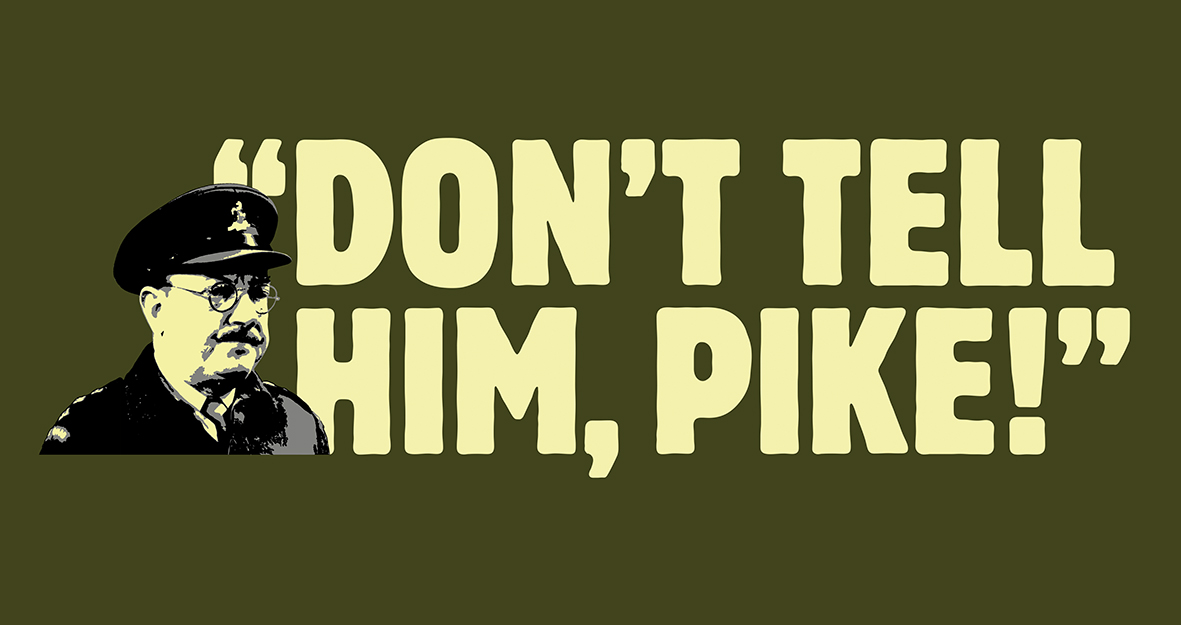
U-Boat Captain Your name will go on the list! Vot is it?
Mainwaring Don't tell him, Pike!
It's nigh on impossible to read those words and not summon up a smile. A smile of remembrance too with this week the last surviving member of the Dad's Army cast, Ian Lavender, aka Private Pike, passing away.
The very first appearance of Private Pike and the rest of the Walmington-on-Sea volunteers featured Lance Corporal Jones the butcher sabotaging any threat of a Nazi invasion by reversing the road signs ‘To the town’ and ‘To the sea’. The result was obvious, a local motorcyclist stops, takes now the wrong turning and off camera there is a loud splash. A comedy classic has begun. It is easy to mock but a decisive connection is made via Dad’s Army with the Popular Front against Nazism which is ever-present amongst all the English slapstick humour. The Bank Manager, his hard-pressed Chief Cashier and the most junior of junior cashiers, the butcher, the miserabilist undertaker who is an English coastline economic migrant from Scotland, the pensioner, the local ducker and diver, the vicar, the verger and their precious Church Hall, the busybody greengrocer. What brought them all together? The defence of Britain and all it meant to them from all that they feared Nazi rule would do in the name of hate. Only a few years previously Oswald Mosley and his British Union of Fascists were being cheered on by the Daily Mail ‘Hurrah for the Blackshirts’. Despite the best efforts of the stalwarts of Cable Street even in the autumn of 1939 after the declaration of war Mosley was still able to attract crowds to his ‘peace rallies’ numbering in their thousands. The mood of appeasement remained ever-present spearheaded by the Tories’ Foreign Secretary, Lord Halifax. The middle-class, and very English, pomposity of Captain Mainwaring of 1940 is too easily confused with the nasty populism of Farage and his like but this is to seriously misunderstand and misrepresent what Walmington-on-Sea’s finest were all about.
These were ordinary men (women, apart from Mrs Pike and Mrs Fox are almost entirely absent) doing extraordinary things and in the course of this reinventing what Britain could become. The selfless sacrifice of Mainwaring’s volunteers in the face of a Nazi Blitzkrieg that to date had laid waste to all resistance in its path is remarkable. In 1941 Hitler would launch Operation Barbarossa and do the same to any resistance in his way on the Eastern Front, until Stalingrad started the turning of the tide of course. The sacrifice is obvious in every episode, the heroism perhaps less so, although when a washed-up U-Boat Commander tries to take over their seaside town Mainwaring’s epic instruction when the Nazi demand his young private’s name ‘Don’t tell him, Pike’ creates perhaps the show’s funniest moment of all. Never mind, the fierce and heroic resistance is obvious in Mainwaring’s voice and puffed-up chest, no fascist was going to push old blighty around.
Of course class divisions remain within the platoon, as they did right across the war effort. Although it is the public-school educated Sergeant Wilson who invariably loses out in the battle of will and leadership with the grammar-school educated Captain Mainwaring. It is however on the ideological front that in the fictionalised Walmington-on-Sea and the real Britain of 1939-45 that a battle was being fought, and won. A popular mood of co-operation, the common anti-fascist cause and a wide recognition that a society led by and benefitting solely those most used to being in charge was no way to win either the war, or the peace. All of this created the basis for Labour’s 1945 landslide including the election of two Communist Party MPs, and the electoral defeat of Churchill’s Tory Party. We’ll never know whether the Walmington-on-Sea constituency went Labour, countless similar seats certainly did, but we can be sure that for at least a time the town wasn’t the place it was pre-1939.
There is a danger that in dismissing the cult of nostalgia that Dad’s Army represented, then and now, that we also lose the meaning of the 1940 moment. How Mainwaring, Wilson, Jones, Frazer, Godfrey Pike and Walker in their own way were the most popular Popular Front of them all.
But a near-constant harking back to World War Two has created a peculiar version of English patriotism. The politics of anti-fascism are airbrushed out. The Labour victory in ‘45 despite Churchill’s wartime leadership scarcely mentioned. The Battle of Britain reduced to a football chant ‘Ten German Bombers and the RAF from England shot them down’ what kind of tribute borne out of ignorance is that? The RAF was never 'from England' and in this most heroic of its battles alongside Scots, Welsh and Northern Irish, pilots and aircrew from Poland, Czechoslovakia, Aussies, Canadians, South Africans and more.
Thus World War Two memorialising has become translated into a petty anti-Europeanism framed by a resentment at France or most particularly Germany but not Britain being the dominant forces in European politics. Dad’s Army gives us an alternative model. Unlike that other long-running BBC comedy set in World War Two Allo Allo the Germans rarely make an appearance and thus their hateful fascism is never trivialised or turned into a misjudged excuse for a laugh. Mainwaring’s platoon are hopelessly funny but never a joke. The opening credits spelt out what was at stake in 1940, Britain versus the swastika making its mark across Europe. This was an anti-nazi war not England vs Germany of ’66 vintage and since.
Dad’s Army was broadcast for 9 years, 1968-1977. Its ending pre-dates the rise and triumph of Thatcherism. It was under Thatcher that Europhobia, or more accurately Germanophobia, came to define the Tory Right and would eventually create the basis for UKIP’s growth too. Given Farage's heartland support lies in England’s left behind coastal towns, he's considering standing in Clacton apparently, it is too easy to rewrite Walmington-on-Sea’s Mainwaring as Thatcher, or Farage, incarnate. But no, rather this was a platoon of community, common cause and if called-upon no little courage. 'Don't tell him, Pike!' Hilariously funny but words too of resistance against the Nazis. You have been watching? The people vs fascism.
Philosophy Football's Don't Tell Him, Pike! T-shirt is available from here

Mark Perryman is the co-founder of Philosophy Football Don't tell him, Pike design Hugh Tisdale co-founder Philosophy Football
Lenin, Levi's and Subvertising a Centenary
13.01.24
Philosophy Football's Mark Perryman offers his blue jeans vs red October dialectic(ish)

In terms of a twentieth century victory and defeat the 1917 Russian Revolution is pretty much epic. Alongside the rise and eventual fall of Nazi Germany it shaped a century that the historian Eric Hobsbawm described as the "age of extremes". This was a totalising politics that for a lot longer than just ten days shook the world. Lenin’s What is to be Done? is a question not a catechism, but to deny the capacity of 1917 and all that to inspire a movement for change, on a global scale, of unprecedented size and impact. Well, if that’s not ahistorical I don’t know what is.
In 1984, ten years prior to founding Philosophy Football me and Hugh Tisdale quite independently, we didn't know each other back then, visited the exhibition Art into Production. This showcased Soviet textiles, fashion and ceramics in that all too brief period, 1917-1935 before Stalin, and Stalinism, bastardised the entire meaning of the Russian Revolution to horrific ends. The vivid colours, the use of plates and clothing, the imagination, joyfulness and pleasure of producing, wearing, using these objects of socialist desire was quite unlike anything either of us had seen before. And tucked away in the exhibition catalogue a rationale was provided for this particular version of a brave new world.
The Young Communists of 1928 had asked themselves not ‘what is to be done?’ But 'What do we want from a plate?’ Blimey, this was a cultural politics of practical production I was entirely unused to. “We want it to be right for its purpose, that is for serving food, we want it to be of good quality and style. These are the first requirements of an ordinary china plate.” Forward to the potteries comrades! But of course, they also recognised that churning out cheaper, better dinner plates than whatever Russia’s early twentieth century equivalent of John Lewis might be wasn’t enough, not nearly enough.
Rather they implored that these plates have “a cultural, educational and organising influence.” Now correct me if I’m wrong but I’ve scoured the John Lewis tableware range and I can’t find a single product offering any such influence. In contrast out of history I'd come across an unfamiliar example of revolutionary promise proffered, something that could never be entirely commodified, a meaning and purpose compromised out of all meaning and purpose.
The Young Communists’ manifesto for plates, cups n’ saucers too, explained the contrast to what they characterised as ‘non-resistance’:
“In this ‘parade’ of objects there are no non-combatants – nor can there be! Plates and cups, things we see daily, several times a day, which can do their bit for the organising of our consciousness – these occupy an important place.”
For the 1917 Russian Revolution centenary, to do our bit for the organising of consciousness we reproduced a number of these original plate designs. We promptly sold out, I'm not sure how much consciousness we organised mind.
Now for the centenary of Lenin's death, 21 January 1924, we've turned Lenin into the ultimate symbol of capitalism vs communism, Levi's jeans. Really? Those of a certain age, and politics, will well remember that for generation after generation of dissenting Soviet youth their badge of rebellion was a pair of Levi's jeans somehow smuggled into the country.
During this period, again for those of a certain age and politics, arguments would rage. Was the Soviet Union 'actually existing socialism' or 'state capitalist' or a 'degenerate workers state' Never mind, in 2024 any such arguments are pretty much settled. The USSR neither no longer actually existing nor is today's Russia socialist, never mind the state bit its capitalist through and through, and degenerate too.
And those jeans as a sign of rebellion? Absolutely everywhere, alongside those three universal symbols of any modern consumer society. The Nike swoosh, the McDonald's golden arches, and that brown sticky liquid which rots our teeth and makes us fat. Putin in charge and the oligarchs raking it in, not to mention the war with Ukraine few would argue the now global reach of capitalism is entirely for the betterment of all.
So, what of Lenin 100 years on? Lenin's death followed by Stalin didn't end well, and that's putting it mildly. The free-flowing imagination and creativity of those beautiful plates and cups replaced by the strictly instrumental and narrowly formulaic of socialist realist art. A one-party state, show trials, purges and Gulags. The Ribbentrop-Molotov pact. Soviet tanks crushing the Hungarian revolt in 1956, and then again crushing the Prague Spring of 1968.
And in 1991 the defeat of Gorbachev's reform communism to be replaced first by Yeltsin, then Putin. It's a sorry tale of bloodied disappointment with not much at all, if anything, to celebrate.
But perhaps those young communists with their cups and plates were on to something, bright and beautiful, original and inspirational, full of hope. Who are we with a world teetering on the verge of envirionmental breakdown to dismiss all that? Hope that across Britain in the1930s inspired hunger marches against unemployment. Hope that mobilised London's East End to stop Mosley's blackshirted fascists at Cable Street. Hope that inspired thousands from across Europe, the USA and Canada to sign up for the International Brigades and travel to Spain in defence of the Republic against the fascist Franco. And after Stalingrad the hope across the entire world that the Red Army could defeat Hitler, which they did.
Hopes, each in their different ways, disappointed, but they existed for a reason, a good reason. In the old-fashioned language of Marxism, a dialectic, or in other words high hopes vs crushing disappointment, they're inter-related. Thus, our Levi's Lenin centenary design subvertising Communism vs Capitalism is a dialectic too. We think Vladmir Ilyich would approve.

The Centenary Lenin Levi's T-shirt is both strictly unofficial and exclusively available from Philosophy Football here
Mark Perryman is the co-founder of the self-styled 'sporting outfitters of intellectual distinction' akaPhilosophy Football
Twelve (reading) Days of Christmas
16.12.23
Philosophy Football's Mark Perryman provides an idiosyncratic diet of books for the seasonal break and into 2024
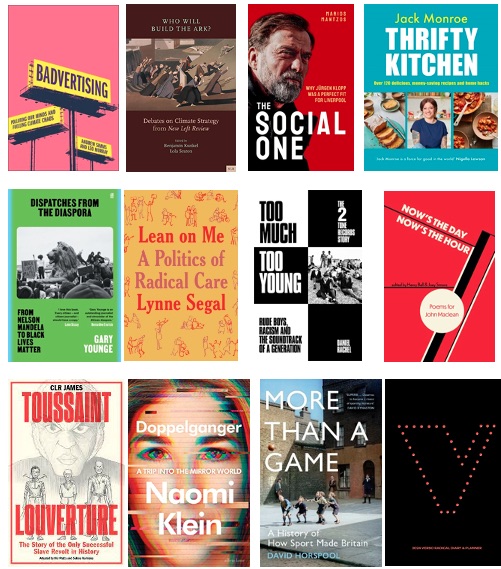
Christmas, a time of giving, receiving, and treating ourselves. For those of us who like nothing more than to curl up with a good book to provoke our thoughts, and actions, of how to change the world, what better opportunity to find the time for such a read. That's if all the eating hasn't sapped our will to do much changing of anything. Never mind, there's always the New Year for that.
Here's my top twelve day's worth of reads to get us agitated, in a good way, over the Christmas period.
1. Andrew Simms and Leo Murray Badvertising: Polluting our Minds and Fuelling Climate Chaos
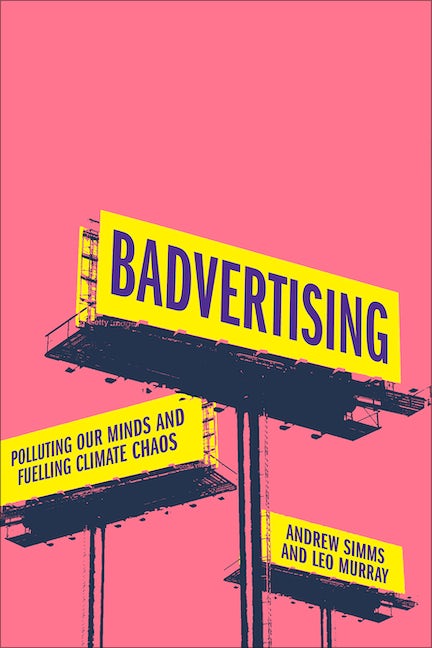
With his previous book Tescopoly Andrew Simms helped establish a connectivity between the hours, often involuntarily, we spend each week shopping and a politics that is both rooted in the everyday and transformational. With the ever-increasing imperative of the climate emergency Andrew's new book, co-authored with Leo Murray, extends that connectivity to the daily bombardment we all have to endure from advertisers promoting the goods that contribute towards this emergency: in particular, fossil fuels, cars, budget airlines, meat. As we struggle under the strain of Christmastime consumerism an inspirational read of resistance.
Available from Pluto books here
2. Benjamin Kunkel and Lola Seaton (Eds) Who Will Build the Ark? Debates on Climate Strategy from New Left Review
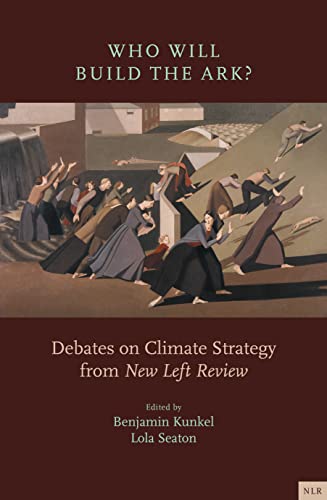
1956 and the Communist Left was reeling from the fallout following the Soviet invasion to crush the Hungarian democratic revolution. Communist families, former comrades, over Christmas dinner hammers and sickles drawn. In those days the Communist Party of Great Britain could count on some 40,000 members. Repulsed by the sight of Red Army tanks on the streets of Budapest over 10,000 resigned, many of whom forrmed the basis of the New Left. The 'new' has taken a variety of forms since, with today a new generation, not only themseves but their parents too not yet born in 1956, carrying forward the tradition. This latest New Left Review collection is testament to both its legacy and currency, most especially Lola Seaton's superb essay 'Green Questions'.
Available from Verso Books here
3. Marios Mantzos The Social One: Why Jürgen Klopp was a Perfect Fit for Liverpool
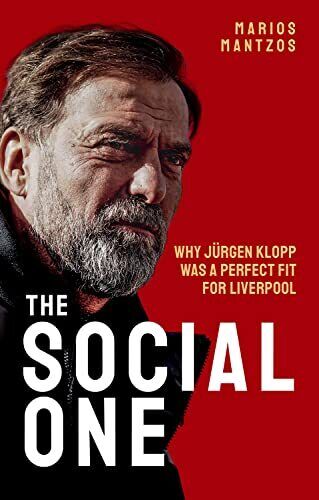
Who will be top of the Premiership once the seasonal squeeze of games from Boxing Day to New Year's Day have been completed? With Chelsea struggling, Man Utd not doing much better while Spurs and Newcastle flirt with inconsistency the field of serious contenders is already narrowing. Villa this season's surprise package, City losing points that previously they'd almost taken for granted, and Arsenal repeating last season's excellent form. All three will surely be in the mix come the final whistle on 1st January. But for most neutrals, well apart from any with residual Evertonian sympathies obviously, if it can't be our own club, we'll favour Liverpool to be top. Not since Bill Shankly has there been a Liverpool, or indeed any club's, manager to attract such near universal approval and affection. The inspired title The Social One says it all, and the case author Marios Mantzos makes more than backs it up.
Available from Pitch Publishing here
4. Jack Monroe Thrifty Kitchen

Christmas is a time of over-indulgence at the dining-room table. For a tasty antidote look no further than Jack Monroe, former firefighter, author of best-selling recipe books, campaigner against food poverty. Its' a near unique combination in the over-crowded world of 'celebrity chefs'. Meals that save us money, delicious into the bargain, with a constant reminder that food poverty is a phenomenon entirely man-made and should have no place in any society that dares to call itself 'civilised'. At 120 recipes, a bumper collection to feed both body and mind.
Available from Pan Macmillan here
5. Gary Younge Dispatches from the Diaspora : From Nelson Mandela to Black Lives Matter
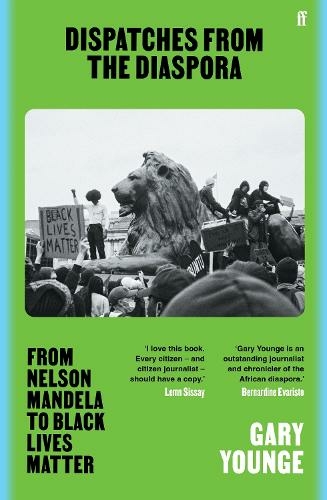
25th December, no newspapers, for news and opinion junkies of a pre-digital disposition an absolute nightmare. But for many Guardian readers our daily paper not such a daily must-read it once was. Steve Bell excluded earlier this year, Gary Younge left as the 2020s began. For many their combined sharpness of comment and acuteness of opinion is a big absence. Steve's cartoons live on featured as Philosophy Football mugs, tea towels, tees and prints. Gary's writing still pops up on occasion in the paper but a real feast of it is provided by this collection ranging far and wide, to remind ourselves of how much we miss his weekly column.
Available from Faber & Faber here
6. Lynne Segal Lean on Me: A Politics of Radical Care
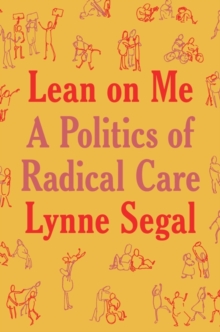
Twelve days, for those with young children, elderly relatives, or both, days of care. Yet the crisis of care is writ large across our entire society, the entire year-round, from cradle to an early grave. Lynne Segal, co-author of the classic text Beyond the Fragments : Feminism and the Making of Socialism makes the case for a society that sees care and caring, as a foundational value. This requires both institutions we can rely upon but also a way in which we live our lives. The personal, as the complement of, not the alternative to, the political.
Available from Verso books here
7. Daniel Rachel Too Much Too Young : The 2 Tone Records Story
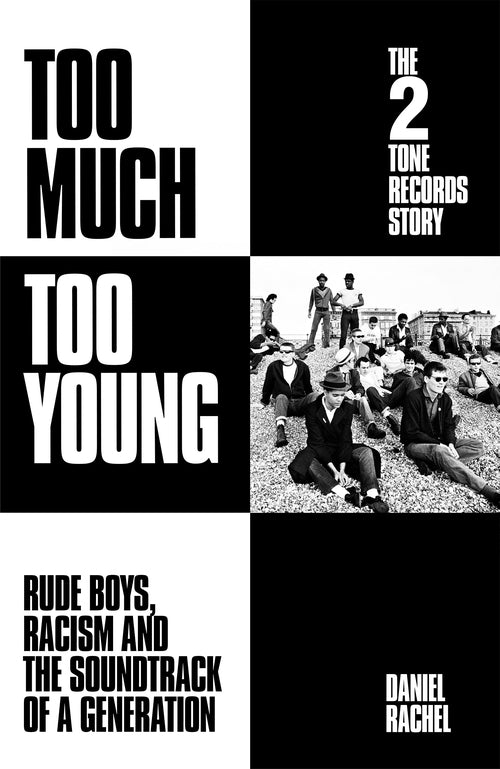
The Specials can count two number ones, Too Much Too Young and Ghost Town but neither topped the charts to grab that much cherished title 'Christmas Number One.' Fellow ska band, Madness came closest, Christmas 1981, It Must Be Love reaches number five. Number One? The Human League's Don't You Want Me. Author Daniel Rachel has become highly skilled at compiling popular oral histories of musical moments and movements. Previously with Walls Come Tumbling Down he brilliantly chronicled what was for me a formative period of the fusion, music and politics: Rock against Racism, 2 Tone and Red Wedge. And now he brilliantly revisits the middle part of that trilogy, 2 Tone in glorious detail. Read, remember, enjoy, then stick some ska on the Christmas household soundtrack.
Available from White Rabbit here
8. Henry Bell & Joey Simons (Eds) Now's The Day, Now's The Hour : Poems for John Maclean
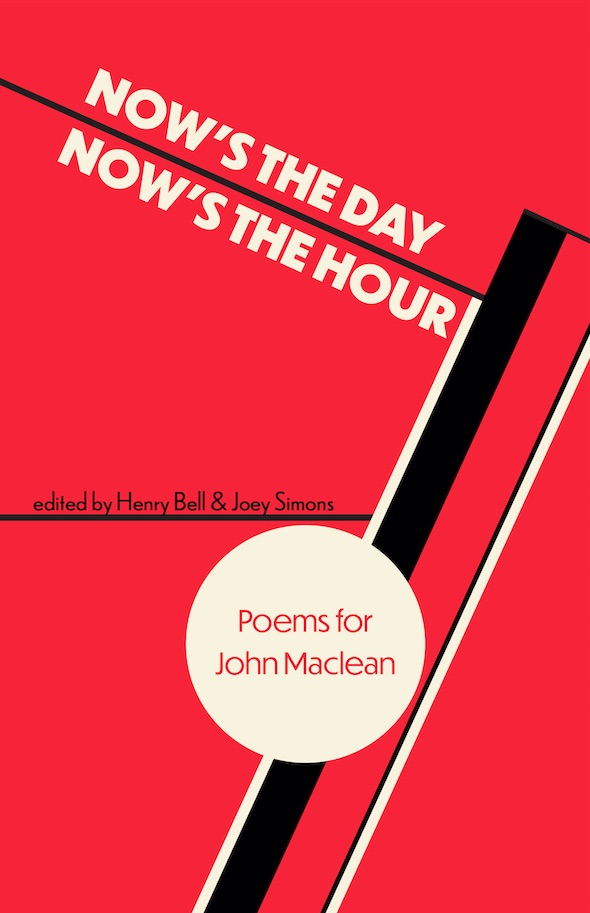
For those north of the border Christmas is simply a staging post before getting down to the serious partying of Hogmanay closely followed by Burns Night. Anyone not yet convinced Scotland and England are two independent nations, the long overdue recognition of such required so we can get on with co-existing as neighbours on one small island, a visit to Scotland on 31st December or 25th January will be more than suffice to persuade. John Maclean remains a towering figure of the Scottish Left, deeply committed to both the internationalism of the 1917 Revolution and Scotland's own particular road to revolution. To mark the centenary of his death, or more accurately his murder by the British state, this collection of poems will lift spirits, Scottish and English,high.
Available from Tapsalteerie here
And for those unfamiliar with John Maclean, check out co-editor Henry Bell's John Maclean biography too. From Pluto Books here
9. Nic Watts and Sakina Karimjee Toussaint Louverture: The Story of the Only Successful Slave Revolt in History
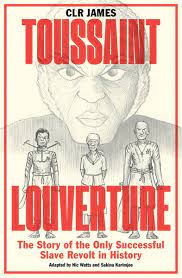
A time of 'peace and goodwill'. Not much evidence of the former in Israel and Palestine, nor the latter for those trapped by the cost of living crisis. But there's always hope, however even that's not enough without the ideas, principles and movements to turn that into change. Christmas 1823, who would have ever imagined back then that the scourge of empire and slavery would ever come to an end? But it largely has. Nic Watts and Sakina Karimjee's brilliant graphic novelisation of CLR James own stage adaptation of his book The Black Jacobins will both inspire and convince that, whatever the circumstances, change is possible.
Available from Verso Books here
10. Naomi Klein Doppelganger: A Trip into the Mirror World

Ghosts of Christmas, past, present and future. A classic Christmas tale, but for materialists who scoff at the supernatural nothing to do with the real world, surely? When Naomi Klein found herself ghosted by a real-life 'doppelganger' same first name, Naomi, and as a fellow campaigning feminist, she assumed Naomi Wolf had similar politics, at first she thought nothing of it. Prominent political women are quite used, if not more than a bit frustrated by, to being confused with other women. But then the 'other Naomi descends into conspiracism, and threatens to drag Naomi Klein, via association, down with her. Not quite the book we might expect from the author of No Logo and Shock Doctrine yet the surprise is richly rewarded with a narrative that is part-thriller and part-investigation, a combination in Naomi (Klein's!) hands that doesn't disappoint.
Available from Penguin here
11. David Horspool More than a Game: A History of How Sport Made Britain
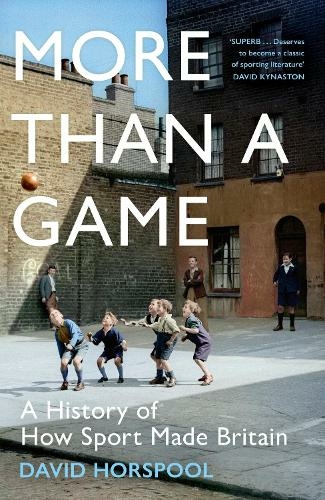
Next Christmas, 2024, it will be 30 years since the very first Philosophy Football T-shirt. Name and number on the back, quote on the front, 'All that I know most surely about morality and obligations I owe to football'. Albert Camus, and obligatory product placement, still proudly available. Well, with that as our founding philosophy how could we possibly resist David Horspool's More than a Game? A thoughtfully constructed narrative combines chapter by-chapter accounts of individual sports and the broader theme each serve to highlight. An account that Camus would have enthusiastically endorsed, and in his absence Albert's kit provider Philosophy Football certainly does!
Available from John Murray here
12. Verso 2024 Radical Diary & Weekly Planner

And then before we know it the twelfth day cometh and 2024 proper begins. A year of almost certainly a General Election, and equally almost certainly the end of 14 years of Tory governments (second obligatory product placement, yes in anticipation - no refunds available - we have the Steve Bell mug to mark 14 years of Tory 'progress' here). Though whether Labour can deliver the change on the scale required remains depressingly unclear.The year also begins with two centenaries, 100 years since the death of Lenin and the descent into Stalinism, 100 years since the first Labour Government and the descent into Ramsay Macdonald's 'National Labour' and a Lab-Con pact. There's the 40th anniversary of the 1984-85 Miners strike too and of Orwell's fateful '1984' While the sport to look forward to includes Euro 2024 and the Paris Olympics. All will be marked by Philosophy Football T-shirts, ('1984' and Euro 2024 are already out and available). Well what else do we need for the start of the New Year? A diary of course! For those not entirely digitalised, Verso's Radical Diary is an annual must have of effortlessly stylish design, packed with monthly and weekly reminders of struggles past with plenty of space to write in the daily details of struggles present, nearest and dearests' birthdays, home and away fixtures, meetings, General Election canvassing days, whatever and whenever 2024 holds.
Available from Verso Books here
Note No links in this review are to tax dodging selling sites owned by multi-billionaires. If purchasing from suchlike can be avoided,please do. Best of all buy from a local, independent,bookshop.
Mark Perryman is the co-founder of the self-styled 'sporting outfitters of intellectual distinction' akaPhilosophy Football
Peace isn't a four-letter word
09.12.23
Philosophy Football's Mark Perryman argues the horrors of Hamas and the demolition of Gaza demand peace and justice for both Palestine and Israel

' Peace' is a word, particularly at Christmastime, that has a near universal appeal. Yet as Israel continues to reel from the bloody horrors committed by Hamas on 7 October and Palestine struggles to survive the reduction of Gaza to a sea of rubble and the murderous attacks launched from the West Bank illegal settlements it is a word almost entirely absent from every discourse around this seemingly never-ending conflict.
For some, on both sides, there is only ever going to be a military solution There won't be.
Others, on both sides, favour a diplomatic solution that stops the fighting but fails to address the causes. That won't work either.
I don't always agree with Jonathan Freedland's column in a Saturday Guardian but they always make me think. Generally I find I learn more from someone I disagree with on abc but find myself in agreement on xyz than from those I entirely agree with on everything.
Jonathan's column on 14 October seven days after the horrors committed by was absolute testament to this maxim of mine.
In all the hundreds of thousands, millions of words written on Hamas and Gaza since there were ten words in his piece that sum up the context of this entire nightmare up better than anything.
'After the Pogrom’ the 19th century pogroms across eastern Europe, the Jewish refugees to western Europe, Cable Street, Jews and Socialists, Communists, Irish immigrants stopping Mosley, together, the Holocaust, on 7 October descendants from the latter murdered by Hamas
'The Angel of Death' the IDF from land, sea and air reducing Gaza to a sea of rubble, hospitals. schools, houses destroyed. The attacks in Southern Gaza a supposed ’safe haven’. A war crime
'Licks his lips' Hamas and Netanyahu. None of this will stop either of them.
Ten words, that explain precisely why neither the Hamas terror attack nor the 4000 plus Palestinian children killed by the heavily armed entirely indiscriminate IDF assault on Gaza will bring peace, and justice, to Israel and Palestine any closer at all, in fact quite the reverse. Because of course both Hamas and Netanyahu share the same objective. Neither has any interest in such a shared and peaceful outcome.
Now I'm not claiming Jonathan shares all the same aims as the Palestine Solidarity protests, there was another one lasr Saturday. And you know what, I don't care, because as much as I support the protests and have marched myself, to reverse this inhuman nightmare we have to be bigger, braver and bolder.
A common misconception is that if a movement is broadened, it is weakened. But if support for Palestine is limited only to those who subscribe to an entire repudiation of Israel then Palestine will never be free of the suffering currently being forced upon Gaza and the West Bank.
Paul Kelemen in his excellent book The British Left and Zionism : History of a Divorce describes an 'awkwardness' arising out of historical context. An 'awkwardness' which he very neatly sums up as on the one hand 'Israel's establishment emerged out of the triumph over fascism and as a restitution to the Jewish people for the Nazi Holocaust'. But on the other hand it was also 'the product of imperial expansion'. However awkward it might be, to unilaterally subscribe to either one without the other is a politics to no good effect.
Purity of intent warms the activist's ideological cockles but as a practical politics fails miserably over, and over again.
The failure is rooted in a fundamental misconception. Supporting Palestine doesn't require being on the Left end of the political spectrum. For all that Jeremy Corbyn and Zara Sultana, Tariq Ali, the far left groups who provide much of activist infrastructure of the campaign and others of a left politics bring to the movement, and they, bring an awful lot, if this is the public sum of our political parts then Palestine will never attract the breadth of support it needs to break this lethal impasse.
When Scottish Labour leader Anas Sarwar, Labour Mayor of Greater Manchester Andy Burnham, Labour Mayor of West Yorkshire Tracy Brabin, Labour MPs Dawn Butler, Jess Philips, Jon Cruddas, Naz Shah, Rosena Allin-Khan, Rupa Huq, Stella Creasy ,Yasmin Qureshi rebel to support an immediate ceasefire the significance should be obvious. None of these Labour rebels would identify with Labour's hard left. And there are many, many more from where that lot come from politically , if the means cannot be made to broaden, to accommodate, what good does that do Palestine's cause?
Meanwhile in Lewes, where one half of Philosophy Football is based, the weekend after the vote on the ceasefire a protest was called against our local Labour Party by Palestine Solidarity activists for 'allying with genocide'. Mmm, with apologies to Lenny Bruce, ' the how to lose friends and not influence people' strategy.
'Humanitarian Pause' vs 'Immediate Ceasefire' has of course divided a Labour Party previously characterised by its near overwhelming unity behind Keir Starmer. Yet however committed, including me, many are to the immediate ceasefire what harm does it do also to recognise that those equally committed to a pause share with us one core objective, we want this human carnage to stop and doesn't that matter most of all?
And those Labour MPs who didn't vote for the ceasefire? Noisy banner-waving protests outside their constituency offices are the easy option and achieve precisely nothing. The hard work lies with turning marching to door-knocking, Street by street collecting thousands, tens of thousands of their constituents' signatures, Labour voters who want their MP to back the ceasefire, and for every household in support a window poster. This is the language the Labour Party understands, and the effort Palestine surely deserves.
What Palestine also deserves is the broadest possible support and there should be no self-imposed limits to that ambition. Ben Bradshaw, Labour MP, fiercely loyal to Blair and now Starmer, he didn't vote for the ceasefire yet with his background as a BBC Middle East Correspondent has made some of the best ever House of Commons speeches on Israel, well informed and hugely critical. Humza Yousaf SNP leader who had family members trapped in Gaza, Layla Moran, Liberal Democrat and the only MP of Palestinian descent who lost family members in Gaza and unbelievably was told by the Speaker this was inappropriate to mention in a Parliamentary debate. And one of the most vocal supporters of Palestine and sternest critics of Israel? Sayeeda Warsi, Tory Peer and former Co-Chairwoman of the Conservative Party.
The list, and the breadth, goes on, and wide.
And not just breadth but means too. However big, however necessary, marches will only appeal to some, but not all. Two examples of the potential.
Yotam Ottolenghi, the Israeli-born British chef and author of best-selling recipe books has helped pioneer the popularity of Palestinian cuisine. Zaytoun import and promote Palestinian delicacies to add such meals both authenticity and purpose. And both link the tasty meals produced directly to the mistreatment of the land and the farms from whence they came.
Or football. Why is it never, ever, questioned why Israel's national team and league clubs compete in European UEFA competitions instead of the Asian Football Confederation where they belong and were members of from 1954 to 1974 when it was forced to leave because no other country would play Israel because of the country's mistreatment of the Palestinians. Meanwhile one of the few arenas in which Palestinian statehood is recognised, by all, is the football pitch. A Palestine national team, competing proudly in Asian Federation competitions. And in the wider sporting orbit 40 years after the murderous Israeli hostage-taking by the Palestinian terror group Black September at the Munich 1972 Olympics, Team Palestine marching proudly behind the Palestinian Flag at the opening ceremony of the London 2012 Olympics. In such spaces Palestine already exists, providing the basis for a common-sense recognition of statehood yet outside of the realm of protest politics barely noticed.
No, like wearing badges, negotiating the 'awkwardness'; of Israel's foundation as a nation-state in 1948, welcoming the support for Palestin of those we otherwise disagree with, finding popular and positive means to identify with and support Palestinian statehood, each on their own isn't enough. But like badges, each can be the start towards something more than the sum of its parts. A popular process of peace, for Israel and for Palestine, no longer being a four-letter word. Now that's a badge worth wearing.
 The Arabic and Hebrew 'peace' badges are available as part of a pack, with T-shirts too, from Philosophy Football here
The Arabic and Hebrew 'peace' badges are available as part of a pack, with T-shirts too, from Philosophy Football here
Mark Perryman is the co-founder of the self-styled 'sporting outfitters of intellectual distinction' aka Philosophy Football
14 years of Tory 'progress'
02.12.23
Philosophy Football's Mark Perryman and cartoonist Steve Bell get ready to celebrate the end of an era
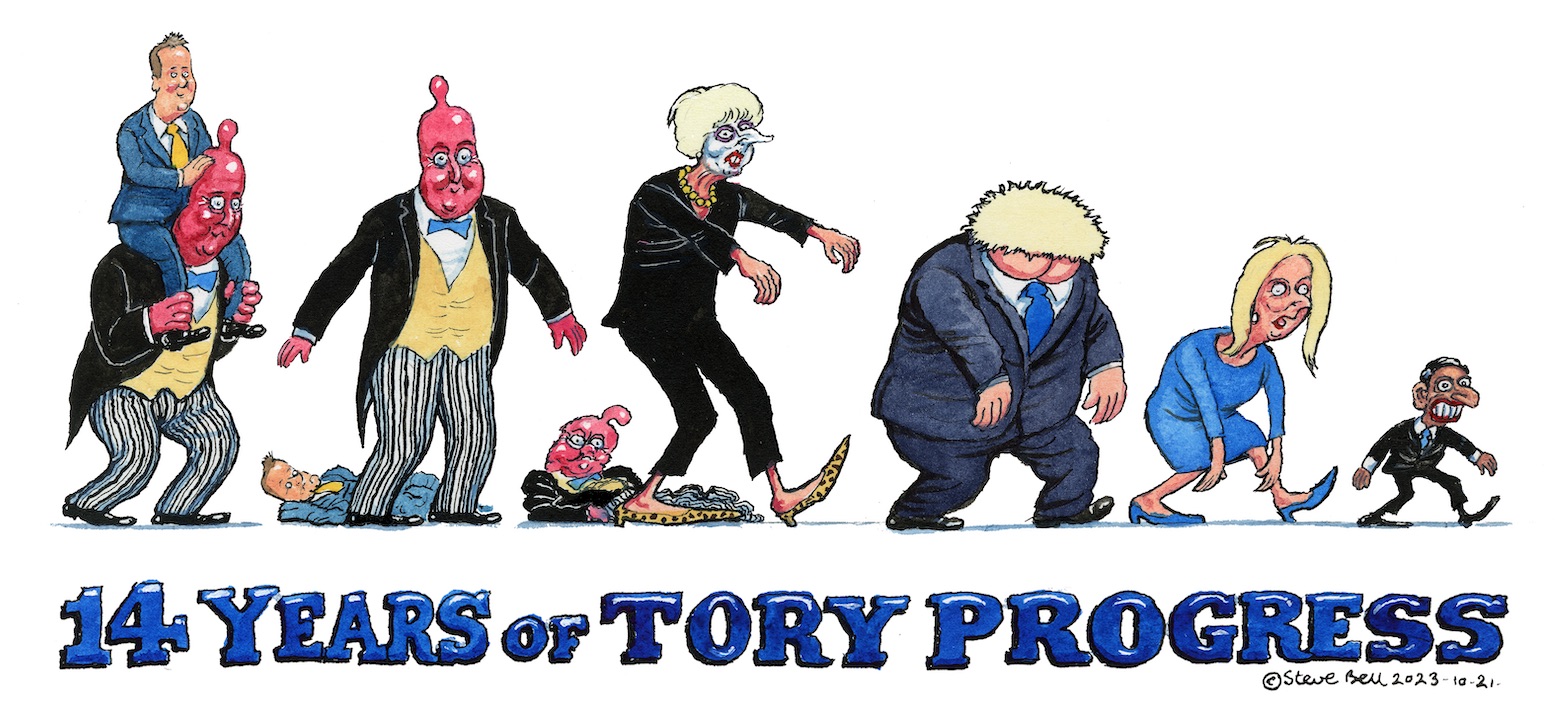
OK constitutionally Rishi Sunak could stretch out his Prime Ministership to January 2025 but in all likelihood there will be a General Election in 2024. With every possibility Keir Starmer will bring to a resounding end 14 years of Tory progress (ahem!)
To put this in context whenever that General Election is held 2024's first time voters, unless they were astonishingly politically precocious during their pre-school years, will have only known Tory governments for their entire lifetime.
We have to go back even further for the last time Labour won a General Election, Tony Blair in 2005. Blair had won with a landslide in 1997 but by the time of his third consecutive win, 2005, Labour's share of the vote had slumped from 43.5% in 1997 to 35.2%, a government elected on the lowest share of the vote, ever. Jeremy Corbyn's campaign in 2019 has quite rightly been recorded as an electoral disaster for Labour yet his heavy defeat was with a share of the vote, 32.1%, not far off to what in 2005 returned Blair to office with a 66 seat majority. Not only is this never, ever, mentioned, but neither is much attention paid to the perversities of our electoral system that can produce two startingly different outcomes on such similar vote shares.
Quite where Steve Bell's inspired notion of portraying the first of 14 year's worth of Tory Prime Ministers as a condom-headed posh boy came from goodness only knows but to mix contraceptive metaphors if the cap fits.....
After Major, Hague ,Duncan-Smith and Howard the Tories finally had a leader, condom head or no condom head, who was able to make Labour look tired, running out of both ideas and time. Cameron's PMQs quip to Blair ' You were the future, once' absolutely inspired.
Blair's long-time rival, Gordon Brown, was his natural successor. Though just to be sure Brown and his cabal of Brownites twisted Labour MPs' arms to ensure the growing grassroots support for John McDonnell didn't result in a contest. Never mind, yet when the subsequently much-lauded Brown entirely failed to create a popular-progressive narrative around the causes and consequences of the 2008 crash his days were numbered. Since the '97 landslide Labour had steadily cast itself as the new establishment, a safe pair of hands the country could trust. When this was shattered, first by the Iraq War for Blair, second by Brown with the crash, well why not give the new guy who hugs hoodies and drives a sled across the climate change threatened arctic instead?
2010 was of course a close-run thing, and would have been even closer if Brown had gone beyond mouthing 'I agree with NIck' to laying the basis for a Lab-Lib coalition. Instead condom-head enters Number Ten with a little help from Nick Clegg, for the next five years hilariously portrayed by Steve as Cameron's loyal and obedient lapdog.
Parliamentary politics can be a dirty business, apart from those who entirely reject the 'parliamentary road to socialism' most of us get that and find ways to accommodate this alongside our desire for ways of conducting politics considerably better. But for the generation of 2010 the sins committed against their education were off the scale. A party that just months earlier had campaigned to abolish university tuition fees was now voting to triple them. A Lib-Dem lapdog that never barked. Revolting students, I mean that in the nicest possible way, descended on Westminster, surrounded Parliament and breaking with the well-worn tradition of marching A to B stormed the Tory Party HQ. This was all too much for Labour, now led by Ed Miliband, who mouthed some platitudes about the betrayal of students before loudly condemning them protesting. The supposedly left-wing lecturers union, the UCU, not much better, solidarity with their students tokenistic, the sectionalism of tripled tuition fees that fill lecturers' wage packets trumping their radicalism.
Meanwhile in Scotland Labour Unionism disconnected the party from a huge chunk of its support. Independence didn't win the 2014 referendum vote but that defeat wasn't secured by the Tories alone. Labour's support was central to that. And the Tories little-helper-in-chief? Gordon Brown. At the 2015 General Election the result was that Labour lost Scotland, reduced from 41 seats to 1, the SNP the sole beneficiaries, up from 6 to 56 MPs.
Still, at least some good news 49 of Nick Clegg's 56 Con-Dem MPs lose their seats. Condom-head isn't able to ditch his coalition partners fast enough. Meanwhile Labour minus those 40 Scottish seats look further away from a General Election victory (note, those who claim Corbyn's 2019 disaster the worst Labour result ever, Miliband and Brown both achieved significantly lower shares of the vote than Corbyn).
Condom-head couldn't be happier, a long Premiership stretched out ahead of him, all that remained was to crush the UKIP irritant and Tory fellow-travellers who made it their business to give Cameron as little respect as they could get away with. And he would have succeeded, won the EU referendum, if he'd not allowed his side of the argument to become 'Remain'. Reducing being European, which most of us are entirely happy with, to one institutuin we mostly tolerate. The timidity of Remain vs the boldness of 'Take Back Control' there was only ever going to be one winner.
And the day after, condom-head jauntily walks away from the mess he had almost single-handedly created.
Thus in 2016 Theresa May, complete with leopard skin kitten-heels, becomes Prime Minister without being elected as such.The kitten-heeled footwear succeeding contraceptive headgear as Steve Bell's signifier of what the Tories march of progress represents.
When kitten-heels showed some bite and called a snap 2019 General Election every single political commentator, and a fair few Labour MPs, confidently predicted a Labour wipe out. A divided parliamentary party, in open revolt more like, Corbyn demonised in the media, he was doomed, surely? Although its been written out of Labour's recent history, quite the reverse. For the first time since 1997 Corbyn's Labour increased the number of Labour MPs, something Miliband, Brown, Blair in 2005 and 2001 failed to do. Wipeout? No, a hung parliament.
And the consequence of this was Labour, if it worked with the other opposition parties and the increasing number of dissident Tory MPs, could block every effort by kitten-heels to rush through Brexit. Which again written out of history, Corbyn did, leading not only his own Labour MPs but the entire opposition plus the Tory dissidents through the voting lobby again and again to thwart May's ill-conceived Brexit plans.
Unitil eventually she was forced out by her own MPs, left to kick her kitten-heels elsewhere, a Tory Prime Minister brought down by the Corbyn-led opposition.
And then we have bum-face, unarguably Steve Bell's greatest creation. Bum-face's mission, to get Brexit done. But despite the public school bluster he couldn't, because Corbyn maintained his Parliamentary Popular Front. If there's one thing above all else bum-face fears it's scrutiny, and in particular Parliamentary scrutiny. So what did he do? Close Parliament down, 'prorogue' a posh word for a coup. But when he was forced to re-open the House of Commons an over confident SNP aided by Lib-Dem leader Jo Swinson, gave him exactly what he wanted. An escape route out of the rigour of such scrutiny, an early General Election, an arena in which his populism, crucially aided by a regressive alliance with Farage's Brexit Party, could only succeed against Labour's now hopelessly confused public position on Brexit. Win the General Election, send the party's Brexit Minister to Brussels for six months to negotiate the best possible exit package then hold a second referendum in which the Labour Party would campaign against its own deal. The architect of this monstrosity of a policy? Mmm, the name escapes me...
So bum-face gets what he wants, all the advances Labour made in 2017 reversed and then some. Bum-face now has a majority to do with what he wants, while the country pays the price, a price when Covid struck which proves lethal.
The rest is (recent) history. Despite a Parliamentary party with a near non-existent centrist group of MPs cast in awe of his bum-faced leadership even they, fearing the multiple loss of their seats, tire of Johnson's disastrous antics. The tussling of his expensively well-groomed hair masquerading as political leadership had run out of time.
And so, Liz Truss. No sooner had Steve cast her as a figure of crouching under-achievement and she is gone, but not before she had blown any remaining credibility of her party's fitness for government to smithereens.
Which leaves us with Steve's mini-Rishi to pick up the pieces. A task he has proved entirely unfit for.
14 years of Tory progress. The descent of Conservative man, and woman, drawn large by the country's most well-loved political cartoonist. And when this lot is finally over next year Steve Bell will no doubt be ready to unleash his other creation, Sir Cardboard Starmer. Can't wait.
Steve Bell's 14 Years of Tory Progress mug, plus tea towel, T-shirt and framed limited edition print signed by Steve is exclusively available from Philosophy Football here
Mark Perryman is the co-founder of the self-styled ' sporting outfitters of intellectual distinction, aka Philosophy Football
- The Death of Innocence
27.12.25 - Thatcherism Today
04.10.25 - Top Ten Books to Understand Labour Conference
26.09.25

